#the most important part is their personalities and character growth but also how they fit each other and work together!!
Explore tagged Tumblr posts
Note
thank you for making good art and having correct opinions about saria and silence 🙏 🙏
waaa hjgjgj thank you! I try my best to keep their characters accurate all the while having headcanons that makes them interesting :] it's the most important part to me
#an entire year of looking at content about them helped me to know what I enjoyed and what I didn't#and a lot of things made me uncomfortable and I just decided to go around them and think differently#im pretty happy with how I view them#the most important part is their personalities and character growth but also how they fit each other and work together!!#askiwi
8 notes
·
View notes
Text
Macaque will be trapped in The Underworld - A season 5 theory
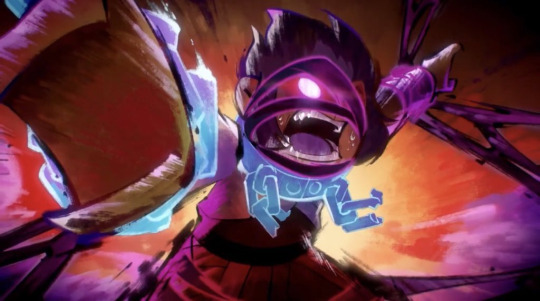
Now, why would this make sense? Because it would fit perfectly with his characther devolpemt so far.
So, lets look at the evidence for that.
Macaque has through these 4 seasons gone from someone who does everything for his own sake, because of his own personal trauma, to someone who is starting to develop direct friendships with our main cast. (which this person talks more about in depth)
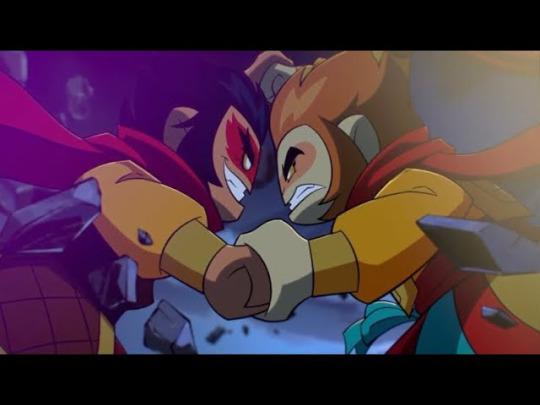

Therefore, it would make sense, if we start going into the most mysterious part of this monkey’s past: His time in the Underworld.
This would make sense for two reasons:
We could get answers on how he ended up in The Underworld in the first place (aka Shadowpeach lore)
We could get answers on WHY all our mystic monkeys are getting accused of breaking the sky, but we would also get some more answers about this guy, The Traitor.
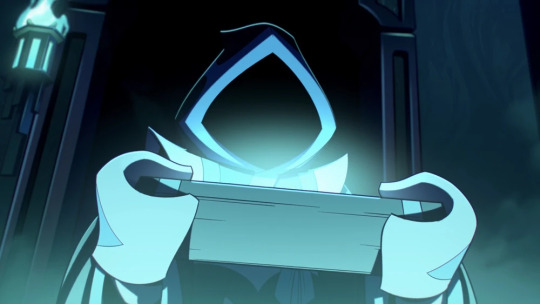
The Shadowpeach part makes sense, therefore I want to go into more details with the whole “Macaque meeting The Traitor” - part of this theory, because they are actual scenes that indicates this in the trailer.
As this person mentioned in a breakdown of the trailer, it looks a lot like here that Macaque is getting sucked into Li Jing's Pagoda (because of that flashing light that looks awfully similar),

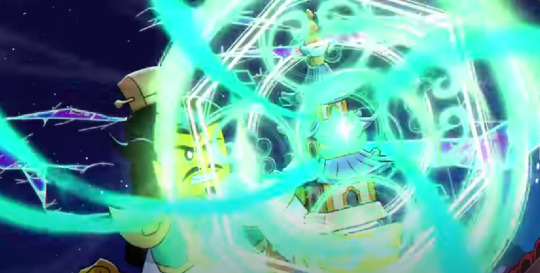
and after I made a timeline of the trailer, I realized that Macaque doesn’t really show up in the following scenes after he supposetly gets trapped in the Pagoda.
So, from a story perspective, it looks like Macaque stayed behind to fight off Li Jing, while the others got away in the car, while he himself got captured. This would then lead to Macaque again getting trapped in The Underworld, so they could keep an eye (pun intended) on him.
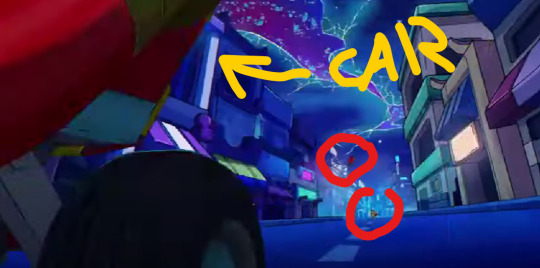
This would then result in Macaque getting (PTSD) flashbacks to his time in The Underworld, where there is a pretty realistic chance, in that time, he MET the Traitor.
Think about it. The Traitors whole goal is “chaos”, and our mystic monkeys are nothing but CHAOS. (talked more about this here)
There is also the fact that a theory (you can find it here) going around that The Traitor was the one who released Azure Lion from his prison, but erased his memory so he didn’t remember how he even got out:
(Season 4, ep 10)
Wukong: Wait, how are you here?
Azure: What, what kind of question is that?! You know exactly how-
Wukong: No, here and now. I put you in The Underworld myself. How did you get out? How did you get the scroll? I know for sure you didn’t steal it, you couldn’t have.
Azure Lion: I- I don’t know… I was…
Wukong: Azure! Who gave you that scroll? Because whoever it was, they must have known this would happen. WANTED this to happen, and they used you to do it.
Azure: I just wanted to make the world a better place.

There is then a good chance that he did something similar to Macaques memory, where one of thoughs memories could be his final fight with Wukong.
The Traitor could have made it so that Macaque remembers it as Wukong DIRECTLY killing him, but as David Breen mentioned, that’s just how Macaque views it.

Therefore, that’s what is going to be Macaque next character development in this season:
What happened in the past? More specifically what ACTUALLY between him and Wukong. Because we, the fandom, don’t know, but maybe MACAQUE doesn’t even know himself.
We can also, with this new information, figure out another important of his next arc: The theme of understanding.
We also know that a lot of the reasons for Wukong and Macaques fallout, is because they MISUNDERSTOOD a lot what the other actually intended.
We also know that Macaque is starting to realize that too, in the way he reacted when he saw his and Wukongs fight again: He realized HE MISUNDERSTOOD what Wukong had meant.

The seeds have been planted everyone, and we are know going to see what they are turning into. And that is a story of Understanding, growth, and friendship (or whatever the hell their realtionship is at this point).

#lmk#lego monkie kid#lmk theory#lmk season 5#monkie kid#lmk sun wukong#lmk analysis#lmk macaque#lmk six eared macaque#lmk liu er mihou#macaque#six eared macaque#lmk shadowpeach#shadowpeach#lego monkey kid#lego monkey king#lmk season 5 theory#lmk li jing#lmk wukong#lego monkie kid sun wukong#lego sun wukong#monkie kid sun wukong#sun wukong#monkie king#lmk monkey king
321 notes
·
View notes
Text

Astarion x Wren
The Lovers Tarot: upright
A fun pass time for me is always thinking which tarot card fits the characters at different parts of the story, and the primary themes that govern them.
Wren (my primary Tav) is the reversed lovers card for much of her early story/game. She longs for connection but is met with a cold, detached world, resulting in mental imbalance and the absence of self-love. She’s lonely and insecure, fearing rejection. Her closest relationship up until the events of the game was with her patron—the capricious (but not malicious) Archfey Kol. He offered her power and the pretense of connection, but never anything real.
For Astarion, while I think another card represents himself (I’m keeping that to myself because I have another art planned around it!) I feel his struggle aligns well with the devil card. He is, of course, more than figuratively shackled to Cazador, but also to the years of abuse, trauma, and his own demons born of that time. The shackles depicted in that card are loose—showing they can be broken should the person choose to be free of their demons.
The lovers and the devil cards are mirrors of one another. The lovers shows security and balance, but also the temptation of the fruit and the snake that could lead to back down the road to self destruction. Alternatively, they are a reminder of what it took to come back from that to a harmonious state.
In my interpretation of The Lovers here, I’ve retained the shackles from Astarion’s devil card. He’s chosen a new path—one where he can be true to himself. The scars will always be there, but the chains are broken. I’ve retained the forbidden fruit as Wren’s crown, with the leaves too represent the personal growth of both characters while the berries (fruit) represent the temptations that would have lead them down a very different path (which I will leave out due to spoilers!)
Fun fact, the Angel in the original card art is Raphael! Very different from everyone’s favorite demon in the game. This Raphael represents physical and emotional healing. I didn’t think an Angel would fit the aesthetics of what I wanted so I replaced him with the moon and Polaris. The first reason has to do with Astarion’s spawn ending so I won’t go into it. The second is taken from the moon card itself, where the moon reveals one’s true self. Paired with Polaris, it represents the moon’s light as a guide, as both embark on their long journey of healing. It won’t be an overnight venture—something that can be fixed by a single entity, so the moon as a guide works better in this context, I believe.
As a personal addition, Wren holds a few nerine lilies—a flower that has been associated with freedom since Ancient Greece. They also symbolize unity, and feelings straight from the heart, which felt appropriate for a relationship where both characters started as strangers to emotional intimacy. (I used to be a florist, I HAVE to have my flower symbolism)
Finally, the clouds at the bottom started life as flames, which in the og tarot card represent passion. As the art took form though, they took on the appearance of smoke/clouds. I could have made it more flame-like but I really liked how this looked, but I also think it fits the slow burn the story ended up taking. There’s a fire, somewhere—but it isn’t the most important thing here.
If you made it this far, thanks for reading my essay. I hope it was coherent!
#artists on tumblr#fan art#nixmori’s art#baldurs gate iii#bg3#nixmori#bg3 fanart#astarion#baldurs gate 3#baldur's gate 3#wren#Tav#astarion fanart#astarion x mc#bg3 astarion#astarion x tav#tarot#character illustration
672 notes
·
View notes
Text
Judai and Yubel's Chemical Wedding
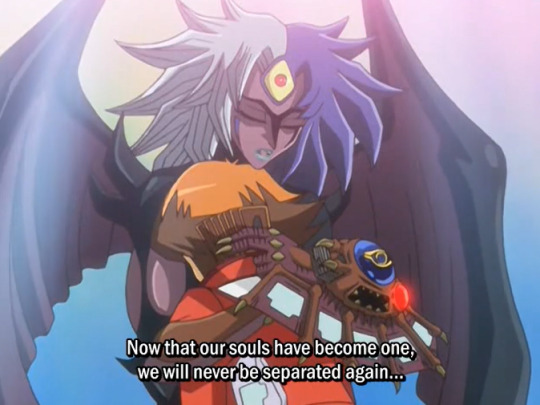
A chemical wedding is central to many alchemy stories.
A chemical wedding is a reconciliation of opposites, often with the most significant character relationship to the protagonist. A relationship which destroys and then remakes them in the better version of themselves.
Jung said that relatioships are chemical reaction. If you have a reaction you can never return to your previous state of being. That's ultimately the role of a chemical wedding in a story. A relationship which is central to a character's development, and changes both parties.
Yubel isn't just important for Judai's character development, they're literally his other half and their union of opposites completes them both in an alchemical sense. Keep on reading below the cut for a lesson in alchemy symbolism.
Peter Pan's Missing Shadow
So, the story goes somewhere in the middle of developing season two the writers recognizing that Judai, would never be able to handle a Marik level antagonist. He lacked maturity compared to the previous series protagonist Atem. The concept of Yubel emerged to make Judai grow, because as he was, he wasn't enough.
Judai fits the archetype of the hot-blooded shonen protagonist almost perfectly in the first two seasons, but even in two seasons where he changes very little as a character the hints are there.
Sho immediately puts Judai on a pedestal, and soon so does everyone else. Judai is praised for his pure heart over, and over. The standards for Judai are set so high you begin to wonder what if Judai wasn't the person everyone sees him as?
At this point is it even Judai that his friends are seeing?
What does that do to a person's identity when everyone around you is love with the idea of you. When you're not seen as a person with flaws.
Judai doesn't grow but how can he, when he's not really allowed to make mistakes. When he's expected to always be cheerful, and always bounce back without help or support.
Judai is pure of heart, but is anybody really pure? The light always casts a shadow.
Jung pioneered a lot of analytical psychology theory. Jung divided the psyche into four parts, the persona which is how we externally engage with the world our public face, the animus and anima masculinity and femininity, and finally the shadow.
Complementary to Jung’s idea of the persona, which is “what oneself as well as others thinks one is” [CW9 para 221], the “shadow is that hidden, repressed, for the most part inferior and guilt-laden personality [...] that is his shadow does not consist only of morally reprehensible tendencies, but also displays a number of good qualities, such as normal instincts, appropriate reactions, realistic insights, creative impulses etc “
The shadow isn't made up of bad qualities, just what we are afraid to show others because of judgement. Hidden as it may be, the shadow is a fundamental part of your personality.
Jung had a deep interest in the shadow – its form and content – and in the process of assimilating “the thing a person has no wish to be” [CW16, para 470]. He saw quite clearly that failure to recognize, acknowledge and deal with shadow elements is often the root of problems in relationships.
Is a friendship with someone real if you're afraid to show any of your flaws?
Juda's never allowed to make mistakes around his friends. He's under constant pressure to fight their battles, to fear he might lose them if he loses.
Ryo, a foil and rival Judai suffers a complete breakdown after losing just one duel. Before that he spelled it out for Judai in the graudation duel, the "perfection" everyone expected limited his growth, until he finally fell apart. If one loss makes Ryo fall then how much farther does Judai who's under more pressure have to fall?
Judai hides his shadow from everyone, but the shadow isn't just a part of you. The shadow is you. You are your shadow. Which is why recognizing the shadow is a critical part of growth - and alchemy. As Jung once said, "The gold is in the dark. And one does not become enlightened by imagining figures of light, but by making the darkness conscious.”
Judai's in unable to grow up, because like Peter Pan is missing his shadow. It needs to be retrieved and sewn back to his feet. Until then, he's stunted and missing an important part of himself.
Judai is missing something important without his shadow. I'm not pulling this from thin air, it's directly stated by the text repeatedly.
Here.
Kouji Satou: We have something that you lack. Judai: That I lack? Kouji Satou: Yes the darkness of the heart that slumbers deep within a duelist. The burden that a duelist bears in his heart. Judai, you have none of that.
Here.
Cobra: You are certainly a talented duelist. But you have one fatal flaw. Judai: A fatal flaw? Cobra: Yes, your duels are superficial. Someone who fights with nothing on his shoulders, cannot recover once he loses his enjoyment. What a duelist carries on his shoulders will become the power that supports him when he’s up against the wall! Cobra: But you have nothing like that! Those who go through life without anything like that cannot possibly seize victory. Cobra: But I know that nothing I say will resonate with you… because you have nothing to lose but the match.
Even, by Judai himself.
Judai: They’re all… They’re all gone. There really was something missing in me. But what is it? What was missing? What should a duelist burden themselves with?
I often worry people will misinterpret Judai's ending with Yubel is unhealthy because he's "caving to the demands of a stalker."
Yubel's not a stalker, they're not even a real person. Judai's a character in a story, experiencing an arc about learning to accept and grow path his worst flaws. How could that arc end with throwing away Yubel, who represents the ugliness Judai tries to hide?
Yubel is Judai's shadow, run away from him just like Peter Pan. Yubel's more than just a cast-off shadow though, Yubel is Judai. A good example of two separate characters coded as each other's shadows in other literature is Katherine and Heathcliff, two characters designed specifically to be two halves of a whole. Katherine once said, "I am Heathcliff", or to be specific she said:
My great miseries in this world have been Heathcliff’s miseries, and I watched and felt each from the beginning: my great thought in living is himself. If all else perished, and he remained, I should still continue to be; and if all else remained, and he were annihilated, the universe would turn to a mighty strange: I should not seem a part of it [...] Nelly, I am Heathcliff! Katherine - Wuthering Heights
So these are two different topics, shadow as a literary foil, and shadow as an aspect of peresonaity in Jungian psychology, yubel is both.
Yubel is the archetypal shadow character, a character who challenges the main character by being their internalized flaws made external.
In a Jungian text when a character won't look at their shadow, they're often forced to look by being confronted with an externalized version of their shadow.
This is the first line of dialogue Yubel says that's not chanting Judai's name in episode 117 to Amon.
Yubel: My power is not especially great. But those with darkness in their hearts can unleash great power in me. Yubel: The pus welling out of your injured heart forms a second heart. I can see that other heart. The darkness in it. Yubel: That's right. That is the darkness of your heart. it's there, in the depths of your mind. Th scream of your other heart, born from your stagnant blood!
Yubel's go-to strategy with manipulation is to throw in a character's face the secrets they've been hiding to make them more liable to their will. Until Yubel can reconstitute their own body, they're forced to act entirely through others, possessing Cobra, then Martin, and finally Johan.
Yubel, the runaway shadow can't exist in this world without glueing themselves onto someone else. Can't be whole without Judai.
Yubel: You'll formally become king. Yubel: It must be great to have your wishes come true. But then, who's going to be happy for you? Yubel: Living in a way that suits you. The one who'd be most happy for you would be that "echo" woman that you loved, am I right? Yubel: But you went and let her die. You won't even be able to see her celebrate, isn't that a bit weird to you? Amon: Silence... Yubel: I know I couldn't stand it. A world without the one I love. It's because of Judai I can feel pain, angiush, and agony.
They say it over and over again, a world without the person you love, even a perfect one like Amon imagines, isn't worth living in.
Yubel: I wouldn't want to live in such a world! Yubel: The world is a place that you make alongside the one you love! What Judai and I make together... that will be the world!
It seems like a one-sided dependence on Yubel's part, but because Yubel is Judai's shadow, Judai cannot exist without them either.
Yubel was literally introduced into the story to spur Judai's character growth after two seasons of stagnation.
Judai seems better off without Yubel. Judai even suggests as much, that it might have been better for Yubel to die in that crater, than crawl back to Judai in their wounded and hateful state.
It seems that Yubel's reapperance triggered Judai's breakdown, and without it the breakdown never would have happend. However, there's two seasons of foreshadowing that JUdai is "missing something" without Yubel, which is why they can't grow or adapt to new circumstances. Judai needed to go through a death of his old self, a loss of innocence to become someone new, that's how alchemy works, that's how growing up works.
JUdai needed to reintegrate his shadow (Yubel) so he could become aware of his flaws, and while he does hit a low point, in the aftermath he can finally better himself.
The question is what flaws of Judai does Yubel reflect?
At first brush they seem as opposed to each other as hero and villain.
There's a tragic symmetry to the way both of them lived their lives for the past ten years. They began in the same place, Judai's childhood was just the two of them together. Then Yubel drove all of Judai's friends away, and Judai sent Yubel away in return.
Ten years go by and Judai attends Duel Academy and makes friends for the first time. He learns of his destiny was the one to protect Neo-Space and the Neo-Spacians led him their power helping awake within him the power of the gentle darkness. Judai spends almost two years almost always surrounded by people, alone in the center of a crowd.
At the same time Yubel has spent the past ten years alone in space, crying out for help from Judai. When they finally return to earth they ask for help one final time only to be met with silence. In that moment Yubel decides that silence is their answer, that abadoning Yubel, ignoring their screams of pain and forgetting them was all Judai's way of showing love.
Judai awakens his powers of the gentle darkness, whereas Yubel is corrupted by the light of destruction. Judai receives the help of everyone around them, Yubel only survives by manipulating several people to eventually crawl their way back to Judai.
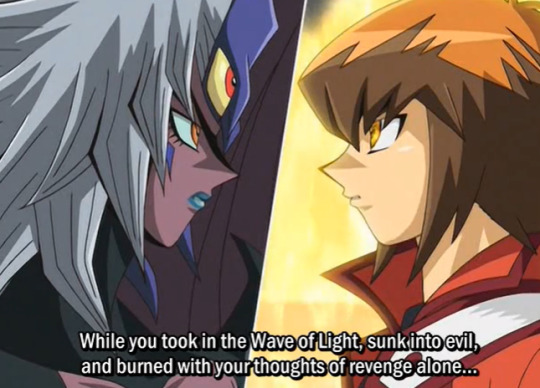
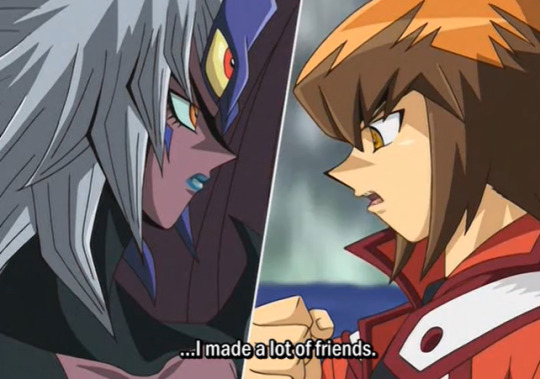
They started at the same point, but by the time they meet again they're completely unrecognizable to each other.
As easy as it is to see them as villain and victim you can flip their roles too. As Judai is responsible for the chain of events that led to Yubel's torture, from Yubel's point of view they are the victim and Judai the villain.
It's unfair to hold a decsion they made when they were five against him. However, abandoning Yubel is a choice Judai continually makes, even after learning Yubel's undergone ten years of torture they were responsible for.
Judai: Yubel didn't come into being by coincidence. I made them who they are.
Judai continually ignores Yubel to search for Johan. However, he's not responsible for Johan. Johan made the choice to sacrifice himself. Wanting to save Johan isn't bad of course, but wanting Johan back is about what Johan represents to Judai not who he is as a person.
Yubel rightfully points out Judai will go so far to save Johan, but won't lift a finger to help them.
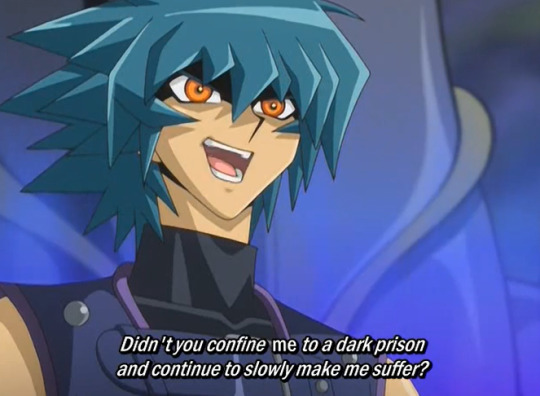
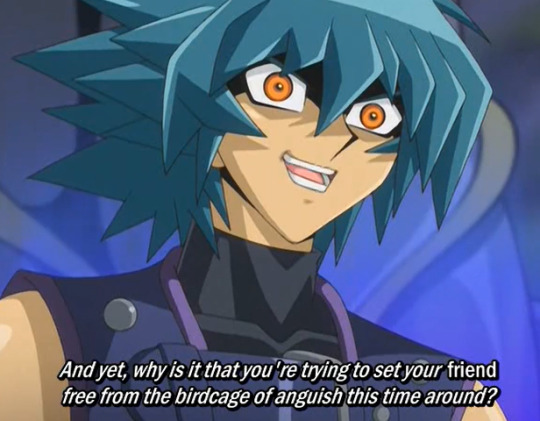
In fact Judai's obsession with Johan, is a narrative flaw (one Yubel reflects for the audience). It leads to his destruction.
Sho even calls him out, his willingness to sacrifice anyone, including his friends for Johan's sake. It's selfishness on his part. To quote this post:
The way he goes after both after Johan in season three and O’Brien shows that he actually doesn’t care all that much for them as people. To him, they represent a concept: Victory, or at the very least atonement for his past actions. A convenient way to right what he did wrong. That is not to say that he doesn’t like them as people - he does. But when the chips are down, what he ultimately wanted was a chance to redeem himself by saving them.
Yubel's obsessive pursuit of Judai to the destruction of everyone else, reflects Judai's obsessive pursuit of Johan destroying his friends.
To quote the above post again.
Yubel is a deeply selfish person as well. However, it’s a different kind of selfish. Yubel has exactly one priority: Juudai. Anyone or anything that isn’t Juudai doesn’t matter, and Yubel will go after Juudai no matter the situation and no matter the consequences.
They're both two deeply selfish people and Yubel is needed to cast a light of this selfish side of Judai. When the two of them are compared though the image blurs, Yubel doesn't have the right to take their pain out on Judai's friends, but Judai goes on to later do the same thing.
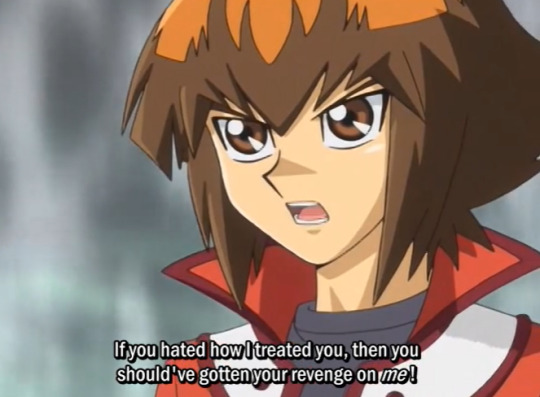
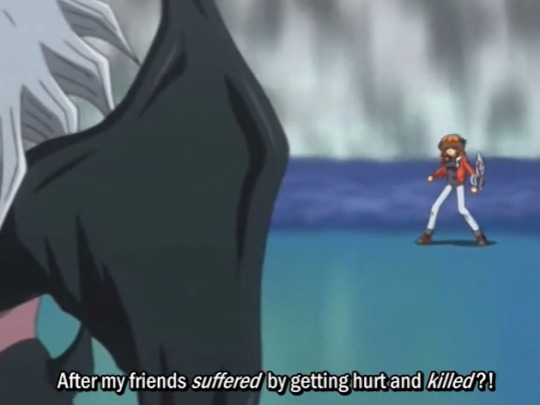
"But then that's the nature of love, isn't it? I wanted all that torment to convey the depth of my love."
Judai rightfully calls out Yubel's involvement of innocent people, but it's hypocrisy on his part. He doesn't have the moral high ground here. Yubel's suffering doesn't entitle them to take out said suffering on Judai's friends, but Judai also slaughtered innocents as the supreme king.
Judai framing Yubel's reaction as revenge is ignoring his own flaws and role in things. Sharing pain = understanding = empathy for Yubel. Yubel wants to be understood, but Judai wants to ignore his shadow.
Yubel's strategy is a kid of forced empathy - to drag Judai down to their level and make Judai understand the same pain so Judai will understand them.
I'm going to quote another post again, this post here.
In her desperation to grasp why she was being made to suffer if Judai loved her, it makes a certain amount of sense that she would latch on to the suffering itself as being something Judai wanted for her. (She knows and admits this isn’t true, btw, but it’s the only thing that allows her even a tenuous grip on sanity) Then, when she was in a position to meet him again, her own views on love would allow her to subconsciously justify making him suffer the same way because her pain had left their life experiences too disparate to form a meaningful connection once more. And the hilarious thing is that she was ultimately right? Yanking Judai down to her level is what allowed Judai to understand her in a way that was impossible before he had his own little fit of love-induced murder spree. I think what people sort of miss is that what Judai is reviling her and calling her an unfeeling monster near the beginning of their duel, he’s the one that’s wrong.
This symmetry they eventually reach where they both become perpetrators shows the biggest thing they share in common: trauma, and how they react to it.
Trauma comes to define both Judai and Yubel, but they react in different ways.
Yubel externalizes their trauma, the same trauma Judai hides internally. What Judai conceals, Yubel by acting out their grief on others reveals.
Yubel wears their heart on their sleeve for all intents and purposes. They will act out their pain on others, gleefully, sadistically so. Their entire philosophy of love revolves around the idea that intentionally inflicting pain as a show of love.
However, as stated above that's a coping mechanism. When Yubel says they want to share pain with Judai, it's not revenge, it's a desire for empathy and understanding. Yubel wraps themselves in a blanket of love, to endure years of torture they suffered alone.
Yubel can't just ask for Judai's love though, they demand it.
This too is Yubel shielding themselves, they're coping with their abandonment trauma. Yubel can endure any pain inflicted on them if they convince themselves that Judai still cares, they can crawl out of a crater if it might lead them back to Judai. If Judai rejects them however, they completely fall apart.
Judai too, is protecting himself from fears of abandonment.
Judai's coping method is opposite, he internalizes all his emotions. The pressure of having to constantly rescue his friends, his fears that he can't lose once, or else he'll lose everything. Judai hides it under a smile, and a fun loving attitude.
Judai even states point blank, the reason he always runs forward is because if he stops to think he won't be able to continue. Judai compartmentalizes everything, and it all starts to pile up so high that if he just can't process it.
Judai: I can’t just stay and wait. All this time I’ve run on instinct, never second-guessing myself. If I just stand still now… I’m sure I won’t be able to start running again. And I won’t be able to get to Johan.
Even Judai taking on his friend's burdens, is done out of a fear of being alone. In his backstory Yubel drove all his friends away and it doesn't seem like he made friends until he came to Duel Academia.
Yubel and Judai both spent a significant amount of time alone, and they both fear going back to that time.
When Judai takes on other's burdens, it's a way to protect himself. If he's constantly doing them favors, they have to stick around right? It's still a transactional relationship though, the same way Yubel thinks all of their love entitles them to Judai's love.
Judai's method is to internalize everything. That seems better than Yubel, because Judai's not hurting anybody right? Except Judai's owbmethod of coping turns out to be just as unhealthy as Yubel's.
Judai carries the weight of everyone on his shoulders until he can't.
Judai's fears of being abandoned become a reality.
It's telling that Judai's breaking point isn't Fubuki, Sho, Asuka and Manjoume's apparent deaths. He's deeply upset by it for sure, but what pushes him over the edge is Sho's rejection afterwards.
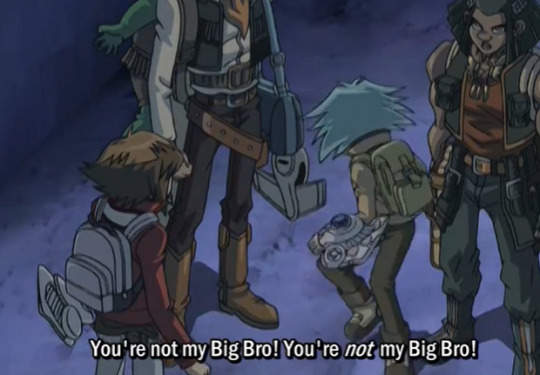
Judai's friends being taken away in circumstances out of his control is one thing, but the fact that Sho leaves him? That Sho sees the part of Judai's self that he's always been hiding and gives up on him. That rejection sends him spiraling, because all along Judai was driven by the same fear of rejection Yubel was.
When Judai reaches his breaking point, he externalizes all the trauma he held within. He starts sacrificing others for power, because he's convinced himself with his friends gone power is what he has left. Judai acts out that trauma on others, as Yubel does with Judai's friends.
In the end Yubel and Judai react the same way to being abandoned, they share the same flaws and the same fears.
Rejecting Yubel, villainizing them, despising them is an act of self-loathing for Judai. However, empathizing with them, understanding, trying to reach out a had to break the painful cycle between them - is Judai accepting himself.
Chemical Wedding
Judai and Yubel become their worst selves when they are alone, they walk parallel journeys in season 3 dragging down Judai to Yubel's level until at last they finally reunite.
This metaphorical union is a chemical wedding, of two opposites coming together. How Judai and Yubel's relationship changes throughout the narrative is vital to how they develop. Their bond develops each of their characters, until they integrate qualities of each other.
The final stage is called a wedding, it's not necessarily romantic but Yubel's 10,000 love confessions can certainly be interpreted that way.
Once again it's not really about what's healthy in a real life relatioship, it's a symbolic journey two characters take in a story. Yu-Gi-Oh Gx uses chemical weddings to develop the romantic relationship between Judai and Yubel.
(What about Bruno - I'll talk about him later next post. Please be patient, I can't cover everything in one post).
Here's another meta on the concept of chemical wedding's in general for a different show. The chemical wedding between Judai and Yubel is woven into the text in may ways.
The show is rife with direct references to alchemical imagery (references to medieval portraits, the solar king and the lunar queen)
A process of death ad rebirth they both undergo multiple times, until their last union where Judai says he might be destroyed by the attempt to fuse with super-poly but he doesn't mind).
The four elements are referenced in the clash between Judai and Yubel, Judai is fire and air - their favorite monster is flame wingman an air and fire hero combined. Yubel is water and earth, their entire deck has a plant motif).
The two of them literally fuse together into someone new. That act is what purifies Yubel's soul by uniting it with Judai, the process of alchemy is purifying metals until they forge gold.
Yubel is also literally a hermaphrodite, and by incorporating Yubel into themselves the two of them together become a hermaphroditic figure.
So that’s the role and importance of the chemical wedding. Pretty vague, right? But over the centuries the most common imagery has been a man and woman--often King Sol/Sulphur and Queen Luna/Mercury--1. standing together, 2. conjoined, or 3. combined into a hermaphroditic figure. -In the Dictionary of Alchemical Imagery, Lyndy Abraham definition of chemical wedding.
The basic formula of a chemical wedding is the union of opposites (Fire and water, air ad earth, sun and moon, light and dark), that union creating a "Rebis", a figure that is both male and female. Judai and Yubel's journey takes them on a path to uniting as one.
It's a violent sometimes dangerous process as in each step dissolve et coagula occurs, in order to forge your better self you have to let your old self dissolved, which is sometimes a violent even painful process.
It's why Chemical Weddings often take the form of violent conflict. A conflict that threatens to destroy both parties.
The first chemical wedding is usually somewhat violent, primitive even, whereas the second one signifies the creation of the stone. However, characters can have more than two weddings (Hamliet).
Yubel and Judai have three violent confrontations in Season 3, before their final union of opposites take place. The three weddings are the three steps in their journey. It's also a process where both experience several metaphorical deaths, before finally their two souls unite into something new (which is why the ship is called Soulshipping).
SOULSHIPPING WEDDINGS - STAGE ONE
Alchemy is a process of continual death and rebirth. Yubel and Judai both go through two symbolic deaths, (the second one they die together to reforge themselves into something new).
Yubel's first death takes place sometime during season 1 and 2. The satellite containing them finally crashes back to earth, and Yubel burns up upon re-entry. Putrefecation, or Nigredo is the first stage of alchemy a process of boiling away all impurities, and it's associated with the element of fire, and associated with the color black. Yubel's spirit form of a black dragon comes out to protect them, and that burns away too. Nigredo is often signified with the death of a dragon.
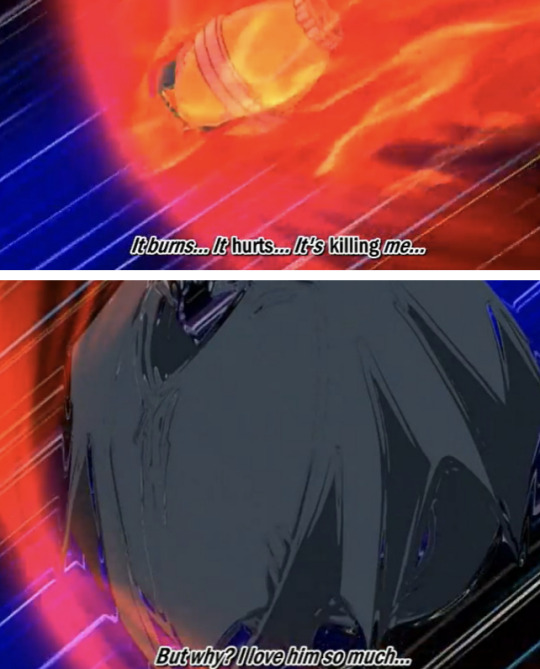
Yubel comes close to death, but their true death is metaphorical.
What Yubel truly experiences is the death of their old self, as the trauma they've endured makes someone new crawl out of the wreckage.
This is the moment onscreen where Yubel snaps and adopts their new philosophy of love, that love is sharing pain with someone else.
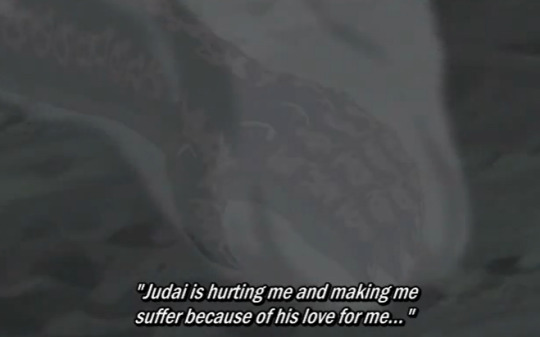
Yubel literally crawls out of earth, out of a crater that could have easily been the sight of their grave. However, their rebirth comes when Yubel reconstitutes themselves in time to meet Judai face to face a second time.
Yubel's true form is revealed then to be that of a rebis.
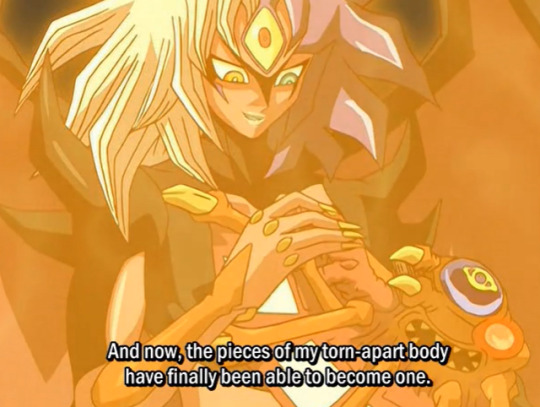
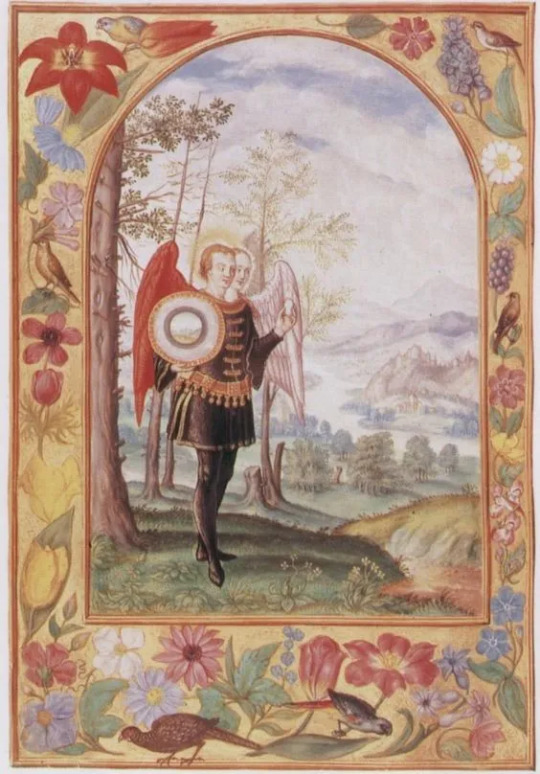
The head on the left is male, the wing attached to his side is red. The head on the right side is female; the wing attached to her side is white and in her hand she holds an egg. This figure is known as the Hermaphrodite, half man and half woman.
Yubel's design is a Rebis, split male and female down the middle. It's even implied in their backstory they were more masculine, and through an alchemical process to become a dragon altered their body to look as such, giving them several feminine traits.
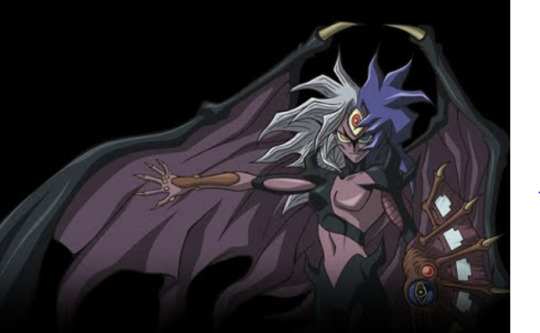
Yubel as one boob and one pec, speaks in two voices a deep masculine one and a light feminine one, defaults to using masculine "ore", but plays a feminine role to comparison Judai's more straighforward masculinity, they even have their face split one side being drawn with eyelashes. The image above is the hermaphrodite and the dragon, Yubel is both.
Yubel can be a reference to the greek story of the hermaphodite or the concept of the Hindu god "Ardanareshwara" which translates to "Lord wo is half woman." Likely both, they have a third eye on their forehead in the place of a bindi in traditional depictions of that god.
Ardanareshwara is the embodiment of the union of male and female energies in the universe, as well as the sacredness of marriage and copulation. [Mythcrafts]
The Splender Solis pictured above are images from the ripley scroll, a in alchemy text. There are 22 plates total, but plates 5-11 are called the parallels they reference the process of death and rebirth.
The seven parables are:
Plate 5 - Miners excavating a hill
Plate 6 - Philosophers beside a tree
Plate 7 - The drowning king
Plate 8 - Resurrection out of the swamp
Plate 9 - Hermaphrodite with an egg
Plate 10 - Severing the head of the king
Plate 11 - The bath
Season 3 goes through all seven, quickly covering the first two plate 5 is mining the Rainbow Dragon out of the side of a mountain, Philosophers beside a tree is Johan's deck using crystal tree, and also Judai awakens after Austin snaps him from his Haou phase underneath a tree.
Judai and Yubel's parallel journeyes reference plates 7-11, #9 was already pictured above.) They both experience two deaths, two rebirths, before their final third union.
Yubel's second death occurs here, at the hands of another dragon (Rainbow dragon is involved).
The first chemical wedding is usually somewhat violent, as metals need to be melted down and reforged through multiple steps in order to create a purer metal.
Judai definitely doesn't want to unite with Yubel their first encounter, they're at each other's throats, in fact Yubel specifically states they want violence, to share as much pain with Judai as possible.
Yubel ends the first wedding literally dissolving gain right in front of Judai's eyes, only to reforge themselves with Johan's body.
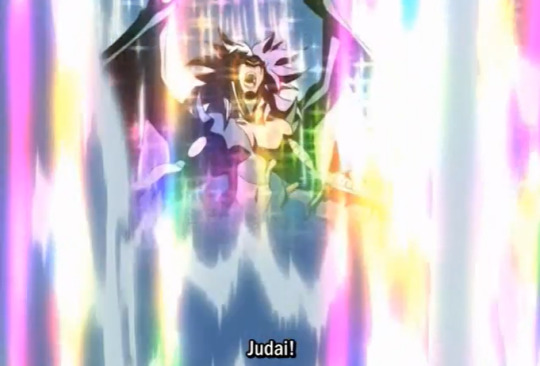
Those are Yubel's two deaths, and Judai's two deaths happen in parallel.
SOULSHIPPING WEDDINGS - STAGE TWO
Yubel is the process of two people breaking down, and mixing until they acquire each other's traits. Yubel pushing Judai down the path of becoming the supreme king, so they can be reunited again is exactly that.
Yubel's plan is to force drag Judai down to their level, so they can be reunited, and at that point Judai having walked a similar path and taken on traits of their can understand them, they tell Judai as much.
So when I solved the riddle you posed I was delighted. ANd that fueled my decision. I would try to fill the entire twelve-dimmension universe with my love towards you, Judai. And once I did, you would have to recognize my loev wouldn't you? That's why I sought to fill all those linked to you, your world, with sadness and anguish. And my line of thinking wasn't wrong!
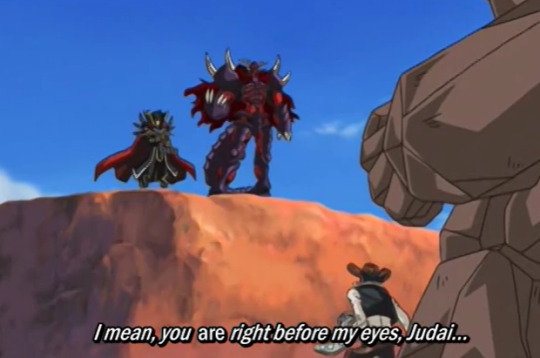
Judai has to go through a process of two deaths mirroring Yubel's own before he can reunite with them in their second wedding. Yubel even says, the first time they dueled didn't work out, because Judai hadn't awakened his darkness of the heart yet. Judai needed to take on Yubel's traits.
Judai's journey to Yubel is referenced by two Splender Solaris plates.
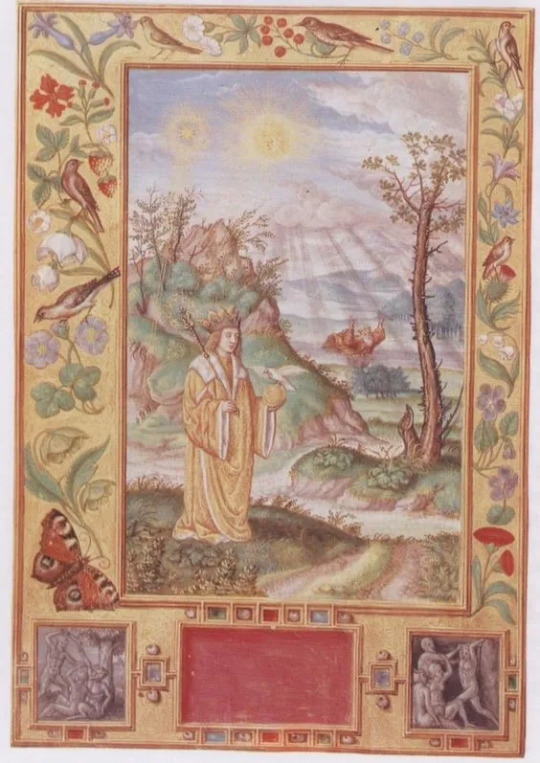
"The destruction of one thing is the birth of another " - Aristotle.
The plate depicts an old king drowning, and a new king being reborn at the same time.
The text describes to us how the old king was taken under, but then reborn the next day from the earth as the new king; the old king must die before the new king is born.
Judai's first death is his breakdown after Sho's rejection, he quite literally experiences a death or self, while at the same time rising up as the supreme king - but it's not a split personality or anything like that, merely an inversion. Judai once internalized their pain, now they externalize like Yubel. Yubel in acquiring darkness of the heart, Judai then begins to take on Yubel's traits, integrating facets of Yubel into themselves.
Within the stages of physical alchemy there is a set referred to as the drowning king; this is the dissolution step of the Nigredo process. This is when the alchemists would take their chemically calcified ashes and dissolve them into water.
Judai experiences the same Nigredo that Yubel does, as his old self dissolves away. Judai sinks into a mental landscape which is pictured as all black, while a new Judai the supreme king assumes his form out of the shadows. The new king has golden eyes, like the new king in the painting is dressed in gold.
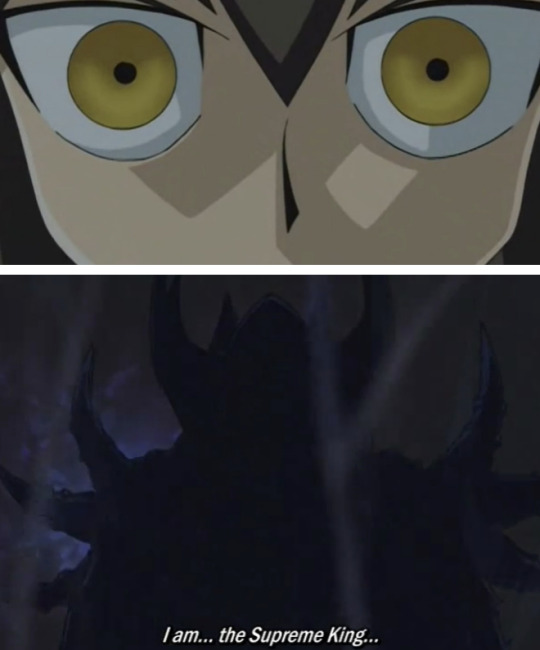
This is where Judai begins taking on parts of Yubel, not only do they lash out at innocent people as Yubel does, don a plate of armor to protect themselves (Judai has black armor, Yubel has impenetrable scales).
It's also a direct parallel to Yubel's experiences. Judai is left alone by the friends who he thought would always take his side and sinks into darkness. Yubel spends years alone in what they call "a capsule of darkness" in space after Judai's abandonment, sinking into denial because Judai couldn't possibly treat them this way when they love them so much.
Judai dies and is replaced by the supreme king, but the supreme king is a just a temporary stage in his development.
In order for Judai to heal he needs to be dismembered first, the Supreme King's head is torn off in a reference to Splendor Solis: Plate 10, severing of the head of the king.
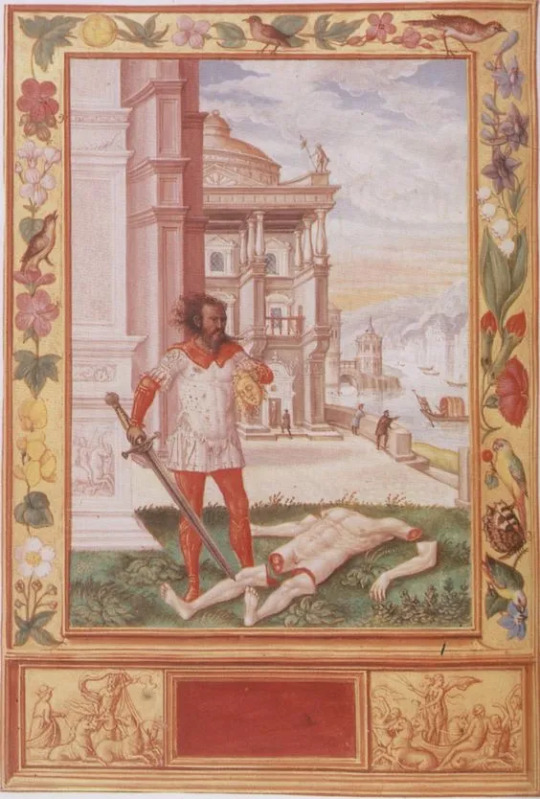
Alchemy is violent; the motto of Solve Et Coagula demands dissolution before rebuilding, tearing apart before putting back together. This idea applies to the material world as well as the spiritual realm; before the psyche can grow, it has to be ripped asunder.
The Supreme King is eventually stopped by Austin, they burn away in in fire, against a duelist with a flame deck, reduced to ash only to rise from the ash reborn like Yubel did out of the crater.
After the end of the duel, Judai's helmet is removed and thrown for all to see to signify the king's dismemberment.
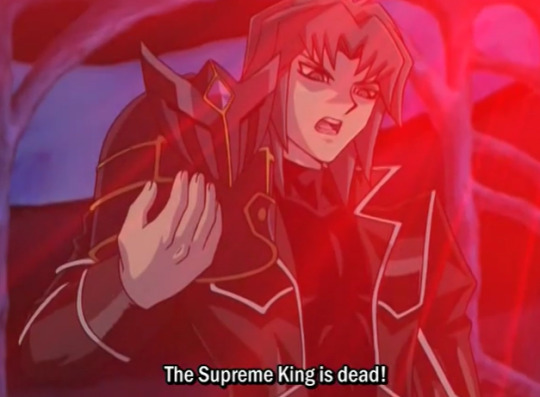
Judai now struggles to become someone new, as he cannot return to his previous state of innocence, but can't keep continuing on as the Supreme King. When Yubel and Judai reunite again Judai has taken on so many of Yubel's traits, they are mirror images of one another.
The second stage of alchemy is albedo, the word is taken from ablutio - the washing away of impurities. When Yubel and Judai meet for a second time, Judai's only priority is to cleanse Johan of Yubel's body, literally through purifying Rainbow Dragon in order to return Johan to his body.
His action in the duel is to destroy the "advanced darkness" field spell which changes Johan's crystal beasts, into darkness crystal beasts. First Nigredo, then Albedo, the prima materia is boiled in a flask where all impurities rise to the surface and make a thick black material, and then those impurities are washed away.
Cleansing Johan's soul doesn't go as intended for Judai however, because the only result is that Yubel reconstitutes themselves for a second time and faces Judai again in their true body.
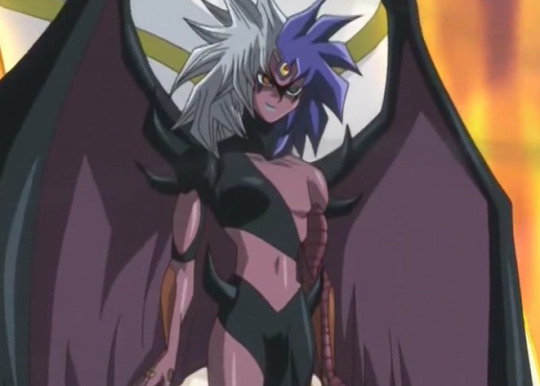
The cleansing turns from Rainbow Dragon from Black to White and both Yubel and Johan are purified into their true selves.At this point they've both experienced multiple deaths, they've both been torn apart and sewn back together again. However, they still have one stage to go.
The duel ends in a draw and they restart another duel facing each other this time, thus beginning the third and final wedding.
SOULSHIPPING WEDDINGS - STAGE THREE
The final wedding in a chemical wedding forges a philosopher's stone, and I bet you can't guess how this third wedding ends.
Everything so far has made use of the death and rebith imagery. Yubel and Judai grow closer each other through a violent union of opposites (extremely violent in this case ). They experience two metaphorical deaths as a part of their journey to finding each other.
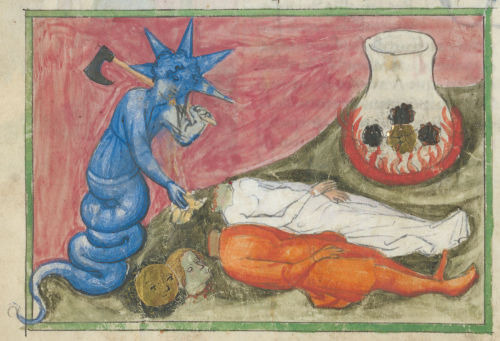
Death and Rebith is a major theme in the last duel, before they both experience their final death together, to become a new being together.
As I said above they've experienced several violent deaths, Yubel is ripped to pieces until they're nothing more than an arm, Judai experiences an ego death and reforms as the supreme king, before the supreme king's armor is torn off him.
In the third duel Yubel's signature monster experiences two deaths, only to be reborn again into stronger forms, yubel terror incarnate, and yubel the ultimate nightmare.
Yubel starts as a one headed dragon, their second form has two heads, their third they fuse with the dragon becoming the third head representing the three stages of alchemy. In the picture above the red, white and blue signify those three stages as well.
Judai and Yubel are also positioned as the Solar King, and Lunar Queen in their duel, just as in the alchemy painting above.
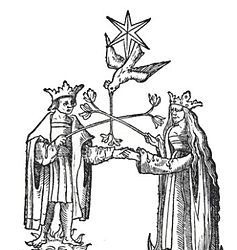
The above image image is taken from is called Rosarium Philosophorum–which literally means “rose garden philosophy. In this case I believe the anime writers are deliberately reference the "rose garden philosophy" name b/c even Yusei and Aki in 5Ds have a similar duel in a Rose Garden that parallels this duel - representing their union of opposites too.
The final duel between Judai and Yubel takes place in a rose garden, intentionally so. Yubel uses two rose themed cards, and their method of attacking and sharing pain nightmare pain revolves around lashing out with a vine covered in rose thorns.
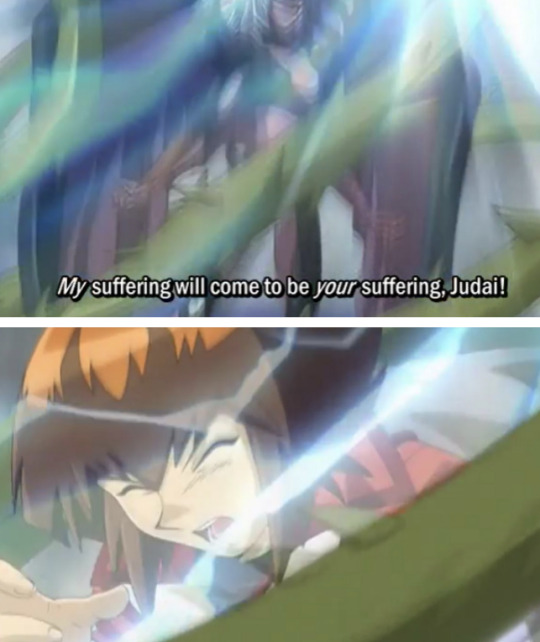
They're both entangled in the rose garden together, as Yubel says my suffering will become your suffering, Judai. Yubel isn't immune to pain they suffer alongside him, for Judai hurtng Yubel is an act of hurting himself. That's also a reference to the ouroboros, the snake biting it's own tail is a common symbol associated with initiating the alchemical process.
Judai has taken so many traits of Yubel at this point they are inseparably intertwined, there's no telling where Judai ends and Yubel begins so any damage Judai attempts to do is dealt to himself as well.
Standing together in the garden Judai assumes the role of the solar king, and Yubel the lunar queen.
Yubel's machinations were to make Judai ascend into a king, Judai is referred to as being like the sun by Sho drawing everyone in.
Bro... Bro, you're too selfish. Before now, I thought of you as the sun. Someone who gave others energy and made the impossible, possible.
Yubel is the moon which orbits around Judai. There's the time they spent in a literal satellite, floating in space among the stars to signify this. Yubel even drops a reference to the myth of Endymion. A story where Selene, the titan of the moon fell in love with a young boy and asked for them to fall asleep and stay young in their sleep forever so they could gave upon them lovingly as they slept.
I will take you to a distant dimmension, where no one will ever reach you. There I will watch over you as you sleep forever.
Once again Judai is fire, and Yubel is mainly plant themed. Judai assumes a masculine role, Yubel after transforming into a Rebis changed their body to take on feminine traits. Judai is the holder of the gentle darkness, Yubel is corrupted by the light of destruction which is engaged in a battle with the gentle darkness.
Theirs is a violent union of opposites, they are literally trying their best to kill each other.
Yubel frames themself as the selfless protector of Judai like a knight or servant, but their obvious desire is to stand together with Judai and be on the same level with him (hence dragging him down).
They spend a duel against Amon reviling him for how easy Amon could throw Echo away, because ultimately Amon is the king, and therefore Echo is beneath him. In fact Yubel was content to just sacrifice their body like Echo and serve as a protector in a previous life, until prince Judai offered Yubel their eternal love, giving something in return and elevating to them as equals.
So Yubel's primary goal is to be by his side, to be lunar queen to his solar king.
In order to accomplish this the art depicted above has to happen, they both have to dissolve, experience a death and become something new together.
Judai even explicitly tries very hard to kill Yubel, saying they'll use the power of the supreme king to erase them from the universe. Yubel similarly, rejected one too many times responds to violence with violence. Their union is inherently marked by violence. However, it's what brings them to a closer understanding of each other.
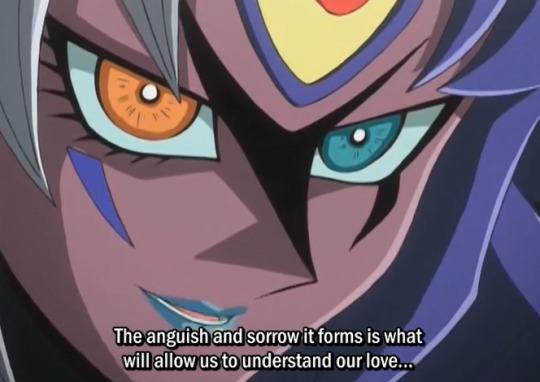
However, while violence brings them closer together, it eventually has to transform into a a union.
As they reach the final stages of the duel, Yubel states to Judai they finally understand that Judai has chosen to respond to all of their love with hate (once again union of opposites, love and hate). At the same time a wind begins to blow, elemental symbolism occurs as the wind and clouds appear in a process of "sublimation", and Judai's past is revealed to him, and he realizes his memory of his past life of the Supreme King.
Sublimate appears as a term for a mineral deposit, by analogy to the alchemical process: minerals in a vapor state, thrown up from the interior of the earth.
The introductory of the element of air also signifies Yubel and Judai moving from Citrinatis, the yellowing, signified by earth to Rubedo the final stage where the philosopher's stone is forged. Judai and Yubel's first duel takes place in a desert (earth), their second they climb high into the sky, and their third they climb even higher until they are standing above the clouds fighting in an arena of air.
Sublimation is a whole new experience of self and reality, both being redefined. Judai's reconciliation isn't just Yubel, it's with the three faces of himself Prince Judai, Regular Judai, and Haou / Supreme King. These memories lead to Judai's eventual decision, to propose a union. This union takes place as the last chemical wedding, which is also a real wedding in everything but name.
Their entire duel contains elements from both japanese and jewish weddings (the three phantasms that Yubel utilizes in the duel against amon are based off of three kabbalistic angels so the jewish symbolism has already been used before).
A traditional Jewish wedding starts with drawing up a marriage contract (Spell Chronicle), and the bride paying out a dowry (the five cards Yubel banishes at the start of the duel). The wedding must be observed by a minimum of two witnesses (Shou and Ojama Yellow). During the wedding the bride circles the groom seven times (Yubel makes 7 successful attacks on Judai between their 3 forms, all others were negated in some way). At the end of the ceremony, the groom presents the bride with a ring (Judai giving Yubel Super Fusion), and a glass is broken to the cry of “Mazel tov!” (the glass window breaking in Samejima’s office). Finally the ceremony isn’t considered complete until the bride and groom retire away from everyone to ... consumate the marriage (Judai and Yubel leaving together). Source [HERE]
Judai attempts to use super polymerization card to start the process of alchemy (fusing the 12 dimmensions - there are 12 steps to Alchemy). However, Judai announces that the two of them are going to fuse together.
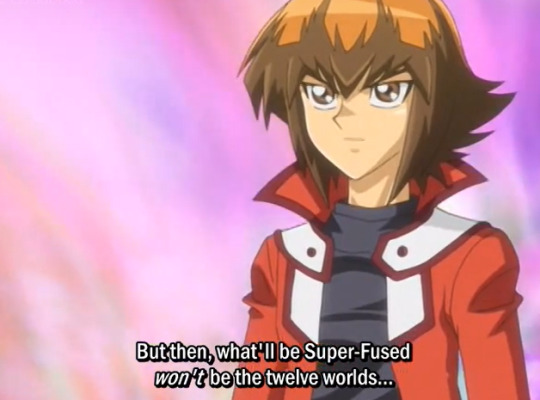
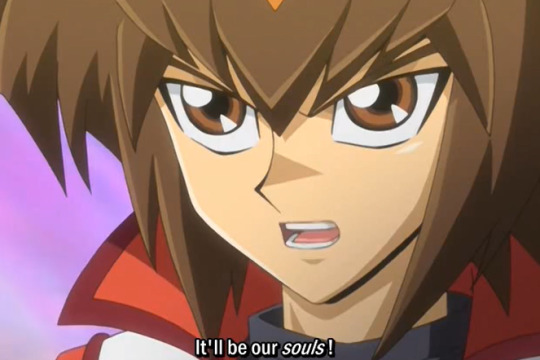
Judai and Yubel's quite literal fusion into one being is the formation of a hermaphrodite. From the essay of "Get your Gender On, Jaden Yuki and Yubel",
Art historian Arturo Schwarz argues that “the Great Work is but a metaphor” in which alchemists don’t create a Rebis but become a metaphorical Rebis themselves, as Judai does over the course of the series. By joining his soul with Yubel’s through “Super Polymerization,” he arguably becomes nonbinary like them. Even before literally fusing with Yubel, he gains “aurea apprehensio (golden awareness) of this marvelous reality: we are gods, because we all are man and woman at one and the same time.”
Hermaphordadites are a recurring symbol in a lot of greek mythology, the name comes from Hermaprhoditus a son of Hermes and aprhodite originally born male. A female nymph fell in love swam to him in a pool and wound herself tightly around his body and begged the gods to never tear them apart creating the co-joined male and female figure the hermaphrodite. The parallels to Yubel and Judai are present, especially in them becoming entangled in one another.
One origin story for humanity is also that human beings were originally two headed, four armed, and four legged beings, combination of men and women, men and men, and women and women. However, they were torn apart into two seperate beings, and forever doomed to go searching and be reunited with their second half.
When opposites are finally reconciled, the great hermaphrodite is formed. Judai even refers to this as an act of finally purifying the light's corruption from Yubel's soul by uniting it with the supreme king's soul. The union is a purifying process, and the end of Yubel and Judai's long journey of losing each other and finding each other again.
However, in order to be purified they have to both let their old selves die in order to form something new, the final death but one they experience together. Just like the painting of the dismemberment of the solar king and lunar queen, they need to be torn apart and sewn back together again.
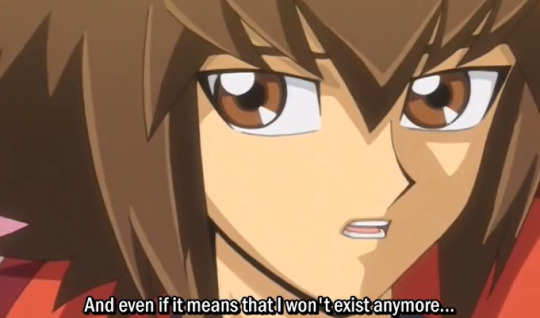
I don't care.
Yubel is finally moved, and all the anger between them is washed away by tears as they're finally allowed to grieve (as death is central to alchemy, so is grief, both are parts of life).
To signify the end of this journey, Judai falls to earth the same way Yubel did at the start of their story. However, while Yubel was suffering, all alone, this time Judai and Yubel are together.
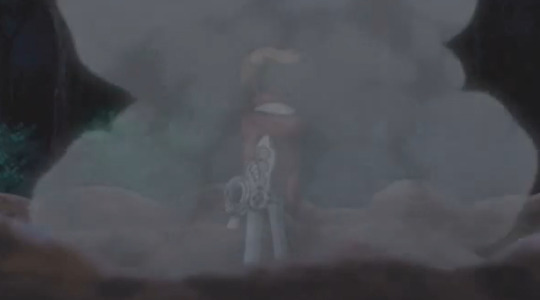
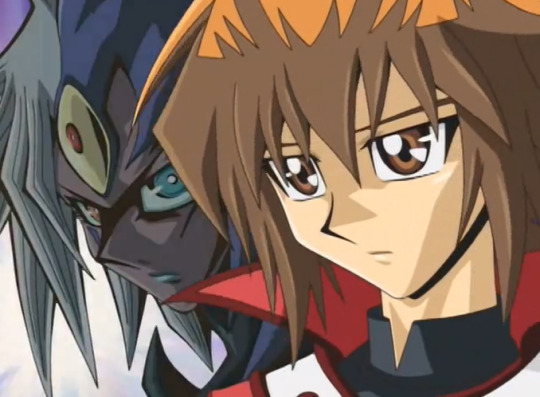
#yu gi oh gx#yu-gi-oh gx#judai yuki#yubel#soulshipping#yu gi oh gx meta#ygx meta#alchemy#jaden yuki#ygo meta
125 notes
·
View notes
Text
Robby's Hero's Journey - The Character Archetypes
Also titled Robby is the underdog - Part 8
(Text in blue font is quoted content.)
A character archetype is a common recurring representation of a character that embodies a set of universal and recognizable traits or characteristics.
Typically, there are 8 character archetypes seen in a Hero's Journey. In Robby’s Hero's Journey, some of the characters' roles are easier to identify than others', but most are identifiable. It's important to note that a character can fit different archetypes at different points in the Journey, though a character usually embodies a primary archetype in the Journey. This post will review which characters fit which archetype in Robby’s Hero’s Journey.
The archetypes:
Hero
Herald
Mentor
Shadow
Ally
Shapeshifter
Trickster
Threshold Guardian
The Hero
The hero is the central figure of the story (protagonist) who undergoes a journey, facing challenges and transformations. The hero often starts as an ordinary person who is then called to adventure. They are present throughout the entire journey, from the ordinary world to the return with newfound knowledge or power.
Robby, of course, is the hero in his Hero’s Journey.
"Well, you are the tree, Robby. You've got strong roots. You know who you are, right? So now all you've gotta do is visualize what you want your future to look like, and then you make it happen."
Robby is the protagonist, which is still shown in s6. In part 2, especially, it was interesting how central he was. Everyone treated him horribly, but he was still at the center of the scapegoating. He was also the only teen to have had all three new antagonist teens be antagonistic or be an opponent towards him. The rivalry between him and Kwon was well-developed, with a lot of parallels between Kwon and him. Zara noticed and later targeted him. Axel was/is set up as a opponent for him in official matches. This can't be said for any of the other teens. Also, the lack of support from all three senseis towards him and the lack of one-on-one conversations between him and the senseis, especially Johnny and Daniel, are glaring. During the brawl, Johnny, Tory, Sam, and Miguel each came or tried to come to Robby's aid.
Based on Vogler's version of the Hero's Journey, stages 1 to 9 spanned s1 to s5, stage 10 spanned s6 part 1, and stage 11 started in part 2. Stage 11 is the Resurrection stage and the climax of the story. In this stage, Robby will have his final "transformation". At one point in part 3, Robby will choose his "need" (believing in himself and finding balance) over this "want" (a relationship with Johnny, for which he gave up who he is and stopped believing in himself) in order to achieve the goal of his journey. Stage 12 of Robby's Hero's Journey will then span the remaining episodes after Robby's final transformation.
The Herald
The herald is the “call to adventure.” They announce the coming of significant change and become the reason the hero ventures out onto a mysterious adventure. The herald is a catalyst that enters the story and makes it impossible for the hero to remain in status quo. Existing in the form of a person or an event, or sometimes just as information, they shift the hero’s balance and change their world.
Daniel is the Herald. He issued the "call to adventure" to Robby in s1e6.

Daniel: "You wanna stick around. Learn something." Robby: "Sure"
The Mentor
The mentor often possesses divine wisdom or direct experience with the special world, and has faith in the hero. They often give the hero a gift or supernatural aid, which is usually something important for the quest. The mentor may also directly aid the hero or present challenges to them that force internal or external growth. After their meeting, the hero leaves stronger and better prepared for the road ahead.
As I went over in my Robby has a Hero's Journey post, Daniel serves as the main Mentor in Robby's story. In fact, he is The Mentor in the The Mentor stage of the Journey. He imparted Robby with lessons about finding balance, understanding who he is, and thinking about his future.

Robby: "I just wanted to get back at him [Johnny]." Daniel: "I know. But you're never going to find balance that way. You can't let that bad blood change who you are. I'm not saying you need to like the guy. I know I never will, but he... he is your father. And believe me, you're lucky to have one. You just gotta try to remember, he's... he's not a monster. He's just a guy with a lot of demons. Mr. Miyagi always told me there's no such thing as a bad student, only a bad teacher. And your dad had the worst teacher there ever was. It sent him down a wrong path. But you don't have to go down that path. Do you understand? You don't have to ever become him. Trust me. You let go of all that anger, and I guarantee you, no matter what happens tonight, you go home feeling great."
Daniel continued to provide mentorship from s2 to s4.
Kreese and Silver have also taken on Mentor roles in important points of Robby’s Hero’s Journey.
In s3e5, Kreese’s advice to Robby was crucial for Robby surviving juvie. This advice led to Robby striking first for the first time and eventually led him to Kreese and to joining Cobra Kai.

"Now you're in the real world, kid. You might wanna learn to strike first."
In s4e1, Kreese also told Robby that he has enough potential to become a champion and he just needs to show it to the world. In s4e10, although Kreese's lesson wasn't good, he was still being a Mentor to Robby when he asked Robby if he was fighting an opponent or a friend, during the match with Kenny.
Silver's lesson to Robby in s4e4 was crucial to Robby's Journey and was the start of the The Approach stage.

"You've learned to channel your anger, but you're afraid... If you want to become a champion, you need to dig out that fear and face it. Because if you don't, it's going to hold you back forever."
Silver also tried to impart a lesson on Robby in s5e9: "There's a difference between being heard and being listened to. They heard you, but they listened to me."
Since s5, in general, Robby seems without a Mentor. Maybe because Johnny is present physically in Robby's Journey now. In anything Johnny and Daniel should both be playing this role, but both are too focused on their own issues and each other. Johnny is also not a Mentor for Robby. Johnny is Robby’s Shadow.
The Shadow
The shadow is the main antagonist of the story. The shadow reflects the darker aspects of the hero, sometimes represented as the mirror image (opposite) of the hero and their beliefs. Overall, they are the antagonist or villains present throughout the whole story in varied ways. The shadow is the "monster under the bed," and could be repressed feelings, deep trauma, or festering guilt. These all possess the dark energy of the shadow. It is the dark force of the unexpressed, unrealized, rejected, feared aspects of the hero and is often, but not necessarily, represented by the main antagonist or villain. However, other characters may take the form of the shadow at different stages of the story as "foil characters" that contrast against the hero. They might also represent what could happen if the hero fails to learn, transform, and grow to complete their quest. At times, a hero may even succumb to the shadow, from which they will need to make sacrifices to be redeemed to continue on their overall quest.
As I talked about in my Robby has a Hero’s Journey post, Johnny is the Shadow character. This is what I said in that post.
The Shadow is one of several character archetypes that plays a role in the Hero's Journey. The Shadow can be the part within the hero that they don't like or that is deep repressed feelings or trauma. The antagonist or villain to the hero usually is the physical version of this Shadow. Robby's main conflict is with his "hate", as his main goal is to break the cycle of generational trauma. Robby's "hate" due to his trauma is his internal Shadow. Johnny is the character and antagonistic force who represents and causes Robby's "hate"; Johnny has been Robby's external Shadow throughout the series. Daniel called Robby's conflict with Johnny "bad blood" in the avt locker room in s1e10. In s2e1, Johnny also said that he doesn't want to have "bad blood" between them. In s3, Robby said that Johnny should be his worst enemy because he abandoned Robby. In s1, after Robby saw Johnny give Miguel the gi and hug, Robby went to Daniel to piss Johnny off. In s4, when Sam brought up that Johnny knows Robby is a "good person" and that Johnny's "trying to change", Robby shifted to anger and said that Johnny had a choice and he chose to become a drunk loser who still hasn't figured out his own life and now he wants to make up for lost time to feel better about himself. Robby then joined Cobra Kai to prove that the Cobras and he are better than them, the Miyagi Fangs. Robby especially wanted to prove that he is better than Johnny. Robby reacted based on his "hate" both times. In this scene in s4e10, Robby is talking about this "hate" that he feels because of Johnny's behavior and him choosing Miguel over him consistently. (He can also be referring to the school fight wrt his "hate" for Miguel, but had Johnny supported Robby over Miguel after the school fight, Robby's "hate" for both of them probably wouldn't have worsened so much.)
In s6, Robby continues to struggle with his traumas. In s6e5, his "second place" trauma was exposited, and that of course has greater roots in how Johnny (and others) treats him. In s6 part 2, Robby's struggle with his internal Shadow is shown to be worsening. He kept losing focus in his fights and eventually resorted to drinking to cope with his abandonment/replacement trauma. In s4e4, he said that doesn't want to end up like Johnny, but by s6e8, his trauma has worsened so much that, when he believed that now even Tory had abandoned and replaced him, he decided to drink for the first time and got drunk, like Johnny does. He also fought with anger, not balance, when he fought Kwon in s6e9.
As I mentioned above, Robby is in the middle of the Resurrection stage. This stage ends with the final transformation and win. Something will happen that will cause Robby to start confronting his worsening mental health and Johnny (especially Johnny's behavior towards him), which Robby stopped doing after the apartment fight (the end of his Ordeal stage).






"I'm sick of blaming you, Dad." Robby is tired of all of the trauma Johnny's behavior causes him. Since Robby said those words, the traumas have worsened. Throughout Robby's life, Johnny has abandoned, neglected, replaced, abused, and scapegoated Robby.
The Ally
Allies are friends or companions who support and accompany the hero through their journey. They often complement the hero's skills and help them face challenges. Allies can also be characters who aren't as close to the hero but offer some type of help along the way.
Robby doesn't have a consistent, trustworthy Ally. Although characters have played the Ally role in his Journey from time to time throughout his story, none have been an Ally the whole way through.
This lack of consistent support from an Ally or a Mentor is actually a key aspect of Robby's character journey. The lack of support impacts his mental health greatly and makes it harder for him to succeed in his Journey.
The Shapeshifter
The shapeshifter adds dramatic tension to the story and provides the hero with a puzzle to solve. They can seem to be one thing, but in fact be something else. They bring doubt and suspense to the story and test the hero's ability to discern their path. The shapeshifter may be a lover, friend, ally, or enemy that somehow reveals their true self from the hero's preconceived notion. This often causes the hero internal turmoil, or creates additional challenges and tests to overcome. The shapeshifter blurs the line between ally and enemy. Often they begin as an ally, then betray the hero at a critical moment. Other times, their loyalty is in question as they waver back and forth. Regardless, they provide a tantalizing combination of appeal and possible danger. Shapeshifters benefit stories by creating interesting relationships among the characters, and by adding tension to scenes filled with allies.
Sam, Tory, and Kenny have this role in Robby's journey.
Sam started out as an ally to Robby, but after the school fight, Sam had a choice and she chose. Although they’re "friends" now, their friendship is superficial at best. Sam still acts like she did nothing to hurt or betray Robby and acts like Miguel bears no fault in the rivalry with Robby. Robby has stopped holding people accountable for hurting him, so he went along with Sam using him in s5 (like she had tried to in s4). He also had his own reasons for wanting to take down Silver and Cobra Kai. They have been "friends" since.

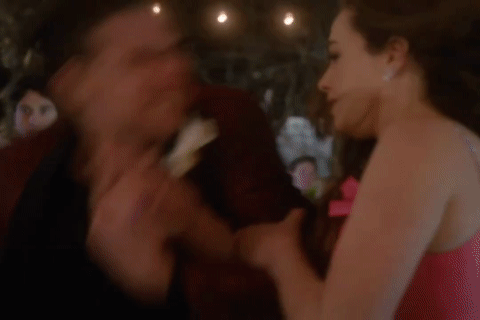
Tory also fits this role. Since they became friends and then lovers, Tory has betrayed Robby twice now. First, as she helped Kreese in s5. Second, as she joined Kreese behind Robby’s back for the ST. Robby isn't faultless in their relationship. In s5, he gave her the break-up ultimatum because he wanted to distance himself from Cobra Kai. In s6 part 2, his side is more complicated as she was putting up walls and refusing to communicate. Both of their traumas were at their worsts. Although Tory believes that Robby cheated, Robby didn't cheat and what Zara did to Robby is not his fault. (Narratively, it is shown that Zara took advantage of him while he was drunk. Robby blaming himself, while not even able to recollect what happened, is par for him. I'll address this again later.)


It was interesting to see how both Tory and Sam betrayed Robby in s6e6. Tory told Sam that she had told Robby about Kreese. This was low because, in s6e5, Tory had told Robby not to tell anyone that Kreese had come to talk to her. Tory also made it sound like Robby knew about the offer Kreese had made to her, but in Tory and Robby's conversation just earlier, Robby asked Tory if this (joining CK as captain) was what Kreese had come to talk to her about. Later, when the others were confronting Robby about talking to Tory, Sam told them that Robby knew about Kreese and Tory. Sam didn't even talk to Robby about it first. Both girls threw Robby under the bus about Tory joining Kreese.
Sam and Tory indeed are this archetype in Robby’s journey. Each girl played a role as his ally, as a friend turned girlfriend. Both relationships feature betrayals of some sort by the girls. Their trust and loyalties with him fluctuate. Both girls are narratively attached to him more than to any other boy (Miguel included).

Kenny also fits this role. He too started out as an Ally. As Robby trained him, Robby did try to curtail Kenny’s desire to fully become Cobra Kai. After Robby showed “no mercy” to Kenny in their match, Kenny chose to fully adopt and stay Cobra Kai. Robby did apologize to Kenny for the match, and it took some convincing from Robby to get Kenny to join Miyagi-Do. (Honestly, I wasn’t so keen on how much Robby insisted that Kenny join Miyagi-Do.) Since then, there hasn’t been much of their relationship. However, this relationship was used as a major turning point for Robby, as Kenny was the “mirror” that Robby looked into during his Ordeal stage. It’s also through Kenny that Robby’s weakness of compassion was explored.


Miguel seems to be playing this role since the apartment fight. Between Miguel not taking accountability in s5e5 and continuing to scapegoat (s6e2), intimidate (s6e5), and bully (s6e6-7) Robby, Miguel puts on the appearance of friendship with Robby. When Miguel "apologized" in s6e9, he didn’t reveal the true context of his behavior: his jealousy of Robby being Johnny's son, and Johnny supporting Robby's captaincy win. Instead, Miguel deflected on the reason. This wasn't an actual apology. Robby believes that Miguel is his friend but Miguel is not. In s5, Miguel only became Robby's "friend" after Miguel got to beat the shit out of him and scapegoat him completely for their rivalry and school fight. The baby plot device also cemented Miguel's place more in Johnny's life. s6e8 showed though that Miguel will not tolerate Johnny favoring or supporting Robby more than Miguel. Miguel is most definitely not a true friend. s6 continues to show that explicitly and subtly. Miguel actually does have a primary role in Robby’s story, which I'll get to in a bit.

The other teens in the Miyagi-Do are shapeshifters too. Their alliance and loyalties to Robby shift, depending on the circumstances. After the school fight, the Miyagi-Dos had taken part in scapegoating Robby for the school fight that Miguel had caused and escalated between him and Robby. Miyago-Do teamed up with the bullies (Johnny, Miguel, Hawk) first, before Robby even joined Cobra Kai, but the Miyagi-Dos called Robby a traitor. In s6, although they're all Miyagi-Do now, the scapegoating for the school fight and other things continues...

The Trickster
The trickster is the jester or fool of the story that not only provides comic relief, but may also act as a commentator as the events of the plot unfold. Tricksters are typically witty, clever, spontaneous, and sometimes even ridiculous. The trickster within a story can bring a light-hearted element to a challenge, or find a clever way to overcome an obstacle.
I’ve been trying to nail down who fits this archetype in Robby’s story. Demetri is a possible character. For example, in s6e6, after they saw Tory in the hotel lobby, Hawk asked if Robby would be okay, and Miguel said that he would be. Demetri bluntly said, in comedic fashion, that he himself wouldn’t be. Though Demetri can be more annoying than funny, he does have moments of levity and commenting about the events. He doesn't seem to have had an important impact on Robby’s journey, as some tricksters may. But again, not all the archetypes in every journey fit the molds exactly.
Anthony may be another trickster, as he has moments of levity and calling things out too.
For Johnny's and Daniel's Journeys, Amanda, for example, fits this archetype as one of her roles. She lightens a lot of moments and calls out the absurdity of events often. She doesn't play this role for Robby’s story specifically though. In fact, she told Daniel to ignore Robby’s feelings after the arrest because Robby’s "a teenager". She also told Daniel to let Robby go after Robby walked away from Daniel outside of juvie. Though, she had given him advice in s2e4 about mistakes. She may be a Shapeshifter in Robby's Journey, specifically.
The Threshold Guardian
I'm going to take some time with this final archetype because a few characters fill this role. I'll also talk about the inanimate Threshold Guardian in Robby’s Journey.
What is a threshold in the Journey?
A threshold can be any dividing line between one point and another. A border between one space and the next, between one state of being and another, the threshold in your story represents a moment in time that changes everything for your protagonist and their fate. They’re crossing over from one form to another, one place to another, one mindset to another. The hero will go through several throughout his journey and each one is important because each means he has "made it" to the next phase of his journey. Often the hero will have to bypass or defeat a person or thing that makes getting through the threshold rather difficult. These beings or obstacles are called "Threshold Guardians"—their purpose: to stop the hero in his tracks.
About Threshold Guardians
This archetype guards the first threshold—the major turning point of the story where the hero must make the true commitment of the journey and embark on their quest to achieve their destiny. The role of the threshold guardian is to help round out the hero along their journey. The threshold guardian will test the hero's determination and commitment and will drive them forward as the hero enters the next stage of their journey, assisting the development of the hero's character arc within the plot. The threshold guardian can be a friend who doesn't believe in the hero's quest, or a foe that makes the hero question themselves, their desires, or motives in an attempt to deter the hero from their journey. Ultimately, the role of the threshold guardian is to test the hero's resolve on their quest. A threshold guardian is an archetypal character who stands between the hero and their goal. The guardian might be another person, or it might be an object, animal, or event. To pass the guardian and progress the narrative, the hero must typically change in some way, try something new, or overcome challenges. The Threshold Guardians often represent the status quo. The hero is the maverick, renegade, or rebel trying to cause change, while the Threshold Guardians are defenders of the way things are. The threshold guardian is usually a secondary or tertiary character whose entire purpose within your story is to be an obstacle for the hero. In the annals of mythology, the Threshold Guardian were generally minions of the story's primary antagonist, and served a very literal purpose. As time passed, and storytelling got more sophisticated, so has the role of the Threshold Guardian. The ally of the antagonist – This Threshold Guardian is actively working to stop the Hero from reaching their goal – the true antagonist of the story. There is often a symbiotic relationship between a villain and a Threshold Guardian.
Miguel is the primary Threshold Guardian
In my Robby has a Hero's Journey post, I stated this about Miguel's role in the Robby's story:
Although Miguel is an antagonistic force towards Robby, Miguel is more an extension of Johnny (and Sam). Robby's actions are primarily driven by his "want" (a genuine relationship with Johnny) and his "need" (understanding who he is, overcoming his "hate", and finding balance), which are both tied to Johnny as he is the main source of Robby's trauma and "hate".
As mentioned, the Threshold Guardian blocks the threshold between the ordinary world and the special world, but Guardians appear at important points to "test"/"block" the Hero.
Miguel is the most prominent Threshold Guardian in Robby's Journey. Miguel especially is (one of) the biggest obstacle when it comes to Robby getting to Johnny, the Shadow.

Robby about Johnny and the Mexico trip: "uh... it wasn't really that kind of trip. But, uh, we did work out a few of our issues. There's still some that are just too big to solve."
In s1e5, although Robby had seen Johnny give Miguel the gi and hug, Robby had only taken an action that would affect Johnny—getting a job with the LaRussos. Robby's first interaction with Miguel was the beach party in s1e9, where Robby tried to protect Sam but Miguel attacked him. In the s1 avt, before going out for the final match, Robby said to Daniel that Robby has to face "him" eventually, talking about Johnny—The Shadow. But, Robby faced Miguel in the match! Miguel is the Threshold Guardian that is an Ally to the Shadow, the Threshold Guardian who has a symbiotic relationship with the Shadow throughout the series. Although Robby lost the s1 avt, he had fought with balance and honor. His win was internal. He and Daniel then reopened Miyagi-Do and crossed the threshold into the Special World.
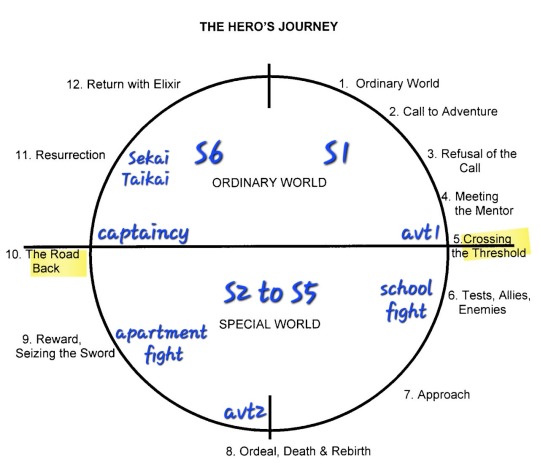
Robby's main fights with Miguel are the s1 avt (Crossing the Threshold), the school fight (Tests, Allies, and Enemies), the apartment fight (end of the Ordeal and start of the Reward), and captaincy fight (The Road Back, another threshold crossing).




Robby's first fight with Miguel, the primary Threshold Guardian, was right before Robby crossed the threshold into the Special World. Robby finally got a victory over Miguel as Robby was crossing back into the Ordinary World in The Road Back stage.
The s1 avt and captaincy fights were points in Robby's Journey where he was crossing the Journey thresholds. Note, in these two fights Robby had balance in his fights. In fact, Robby’s struggle with balance was featured as a component of each fight. Yes! Robby’s poor mental health/balance is also a Threshold Guardian. I will get into this in a bit.
The school and apartment fights each resulted in major shifts in Robby’s journey, both externally and internally.
The school fight took place during the Tests, Allies, and Enemies stage. Miguel pushed Robby to his limit. He lost his balance, had a "fight" trauma response, and accidentally injured Miguel. After this, Robby expressed hopelessness in his journey for the first time, "But you were right. It was a mistake trying to help me because I can't change." Robby was contemplating giving up on the Journey. Robby was put in juvie and lost everyone’s support.
Robby did give up on his goals for a time. Then, in s4e1 Robby decided to compete for the trophy and a better future because of his conversation with Sam, in which she'd brought up Johnny and that triggered a trauma response in Robby. In s4e4, Silver's advice to Robby to face his fear emboldened Robby to confront his Shadow once again in The Approach.

"For as long as I can remember, I've been afraid... afraid that I'm gonna end up like you. But that's not gonna be my fear anymore... because I am better than you."
The apartment fight took place at the end of the Ordeal stage. Robby was pretty much beaten into place by both Miguel (the main Threshold Guardian) and Johnny (Shadow) as part of the toxic family. Robby was also welcomed back by everyone. However, he had to give up who he is, including his self-worth, as he stopped standing up for himself and his side of the story. Because of the situation, he chose his "want" (relationship with Johnny) over his "need" (who he is and finding balance). At the beginning of the Ordeal in s4e10, Robby had expressed his second statement of hopelessness. "I screwed everything up… It just made things worse and now it's never going to get better... I'm sick of blaming you, Dad." At the end of the Ordeal in s5e5, Robby ended up giving up who he is because it was never going to get better.
Both environments/situations that Robby entered into after the school fight and after the apartment fight have been traumatic but in different ways. Both have resulted in severe internal changes in Robby, further worsening his mental health and worsening his struggles with balance. Robby’s losses, in karate and in life, are setbacks in his Journey. Not to mention, the apartment fight was a mirror to the school fight.
Since the apartment fight in s5e5, Miguel has played a Shapeshifter role, as I described above. However, Miguel's primary role in Robby's Journey is that of the Threshold Guardian, especially when it comes to his attachment to Robby's external Shadow–Johnny. Miguel's conversation with Johnny on the plane in s6e8, for example, is a setback for Robby gaining a true relationship with Johnny. The little bit of "support" Johnny gave Robby because he'd won the captaincy was challenged by Miguel. Johnny's attention straying from Robby to Miguel and staying focused there, like after the school fight and for the Mexico trip, are other examples of how Miguel is an obstacle in Robby's Journey to achieve his goals ("wants" and "needs" are both goals).
Miguel's antagonistic behavior towards Robby when it comes to Johnny, Sam, and the karate championships (especially in S1 and S6) are interestingly described by the following:
This important archetype character's entire existence is wrapped up in guarding the threshold. For this to make sense as you create your story, there has to be a really good reason why. Finding out this reason why will help you build out your threshold guardian character's backstory and motives (because, remember—every character, even the secondary ones, need motives). In many instances, threshold guardians are willing to make dramatic sacrifices to protect their threshold. They want to keep their special world separate from your hero's world. They don't like the fact that your hero is trying to shake things up by crossing between the two. It's messing with the status quo. Maybe the guardian realizes that the hero's willingness to cross boundaries is a threat to the way things have always been.
Carmen is also a Threshold Guardian, an indirect one. She actively scapegoats Johnny and Robby for Miguel's faults and violence in the fights and has kept Johnny’s focus on Miguel, like when Johnny talked about his failures with Robby or about being uncomfortable being a “dad” to Miguel. The baby plot device, for all intents and purposes, is a Threshold Guardian as well. I've always said that the baby was introduced primarily to impact Robby in his character journey. He is the only one who changed because of its introduction into the story. And the circumstances around that change moved Robby from one stage (The Ordeal) to the next (The Reward) in the Journey. In s6, the family scenes being done in a way that excludes Robby, either subtly like with everyone praising the scapegoating essay or explicitly with Robby not present at all, is also very telling. (See my post about Johnny, Robby, and the family in s6 part 2.)


Robby's "hate"/trauma is also a Threshold Guardian
Robby's "hate"/trauma is a Threshold Guardian, in addition to being his internal Shadow. This is shown explicitly in a lot of his fights. The battle is both internal and external in these fights.
The internal threshold guardian - While not as common and not as easily recognizable, sometimes stories include internal demons as threshold guardians—something within your main character that's preventing them from moving forward and that they must learn to overcome. It might be a past trauma, addiction, fear, etc.
The overall theme of the series is about finding balance, not just in karate but in life as well.
"You remember lesson about balance? Lesson not just karate only. Lesson for whole life. Whole life have a balance. Everything be better. Understand?”
In my Robby has a Hero's Journey post, I said this:
In s4e10, Daniel told Hawk during his match with Robby: "This fight is not about him. The biggest battle is always the one within. Okay, concentrate, defense, focus, power. You find your balance, and those points will come. All right?" This also applies to Robby's journey and his conflicts with his "hate" and with Johnny.
In that fight, Hawk resorted to mostly using Cobra Kai against Robby so didn't need to rely on his balance, while Robby resorted to mostly using Miyagi-Do, lost his balance after he looked in the "mirror", and eventually lost the fight.
Robby's balance has been emphasized in Robby's fights with Miguel and Hawk throughout the series, and in Robby's fights in s6 part 2, as part of The Resurrection stage.

Hawk is another main Threshold Guardian
Hawk had first injured Robby in the s1 avt and that enabled Miguel to do more damage. Hawk was also the person Robby fought and lost against in the s4 avt. This was the start of Robby's Ordeal stage. He lost his balance during that fight and lost the fight.
In my Keeping the Peace post, I talked about the correlation between the s5e8 scene of Johnny recapping the avts with the boys (more unreliable narration on Johnny’s part; Johnny keeps trying to reframe Robby's reality) and Robby’s s6e5 shadowing boxing scene.

Interestingly, in the s5e8 scene, Robby is sitting with his Shadow–Johnny–and the two main Threshold Guardian characters —both of whom were trained by Johnny and primarily use Cobra Kai as their fighting style like Johnny does (while Robby primarily uses Miyagi-Do). Johnny talked about the first avt, the main fight during the Crossing the Threshold stage, as if Miguel hadn't cheated and as if Robby had lost the tournament fair and square. In s6e5, Robby’s "second place" trauma was emphasized using the avt matches to these two Threshold Guardians.
Other Threshold Guardians in Robby’s Journey
Trey and Cruz were the obstacles Robby had to overcome in the Refusal of the Call stage in s1e7.
Shawn played this role in s3. Robby had to defeat Shawn in order to "advance" in the Journey. In this case, Robby chose to strike first for the first time.
In s4e1, Robby had to fight the Cobras to secure his place as their leader. They became his allies after this.
In s6 part 2, as part of the Resurrection stage, all 3 new antagonists played some role in Robby's Journey. (I will speak objectively about Zara here, based on what is portrayed in canon. My post about the SA and it's framing and marketing explain that all of Robby's traumas, especially by other characters, are framed and marketed the same way. I will treat the SA as I treat those other traumas and will address it as such.)
Of these three, Kwon was explicitly set up as Robby's rival. He has many parallels to Robby. While Miguel is a foil character to Robby, Kwon is a mirror character to Robby. (I hope to address this more in a post about Robby in part 2.) Robby kept losing to Kwon until their match in s6e9. Although that fight is cool, Robby fought with anger and made sure to make it hurt, which made the Shadow proud. Robby didn't rely on Miyagi-Do and didn't fight with balance. In terms of succeeding in his goal of finding balance, Robby had a major setback. He was angry that he'd fallen for Kwon's mind games, and he took his anger out on Kwon. Kwon fits this description of a type of Threshold Guardian.
To increase tension and add to your hero’s internal development, this archetype should represent something greater to your hero than just a simple test of their ability. Maybe your guardians represent the bigger, worse villain that your hero will need to go up against in the future. Maybe they represent your hero’s internal conflicts and faults that they’ll need to overcome at some point. Maybe they represent a weakness that your hero has been trying to hide.
Miguel matches the first "maybe" that is listed. Kwon seems to match the other two "maybe" because a lot of Kwon's insecurities matched Robby's.
Zara is another Threshold Guardian. It stuck out to me that Robby losing in his matches really hit him hard after the SA. He seemed to be somewhat coping with his lost matches before that, even with Miguel bullying him about his poor performance in his matches. But, it was after the SA that he blamed himself for the whole team losing. Hawk and Demetri were being dumbasses about Kenny and had made things worse in their first group match, but Robby just put it all on himself. When Miguel talked to Robby, Robby specifically mentioned messing up off the mat too, when he said that he shouldn't be captain anymore. His drinking didn't seem to upset him; what Zara had done upset him much more. He specifically called the latter the "stupid" thing he "did". This makes sense because of his confusion and self-blame over it. This experience traumatized him, like his other traumas have. His self-blame increased and his mental health worsened.
Axel is another Threshold Guardian. He is an interesting one because Axel and Robby didn't interact much until their match, which was interrupted. They will compete again in part 3. I did find Axel's line and frustration with Robby interesting: "Are you going to keep defending, or are you going to fight?" When I heard this line the first time, I thought: "This is some meta-commentary about Robby's people-pleasing." Robby has stopped fighting for himself and has been on defense with all of his "friends" and "family". He has shown his edge once in a while, like with Miguel in s6e5 and s6e7, but it's not enough. Robby's people-pleasing is a defensive behavior he has to consciously counteract to start fighting for himself again. Threshold Guardians challenge the Hero. Axel’s line stuck out because Robby is at that point in his journey where he needs to stop defending and start fighting his main antagonists, his Shadows.
Although the Axel-Miguel rivalry is set up, not much thought and time has been put into developing their rivalry. Axel's interest in Sam is the only basis for it. Kwon and Robby's rivalry was well developed. Kwon is a mirror character to Robby, but Kwon was obviously a misdirect. Axel seems to be another misdirect as the final Threshold Guardian before Robby faces his Shadow. Axel is set up with a sad backstory (meaning his redemption is set up), and his conversation with Sam on the beach foreshadowed him joining Miyagi-Do. Miguel is the one who has been at the main thresholds. He is the primary Threshold Guardian. (Hawk is secondary to him). Like Robby had said, he and Johnny still have some of the issues (Miguel/Diazs) that are too big to solve. s6e8 showed that Miguel is still an issue between Robby and Johnny. Robby is also excluded from the family in important ways. Miguel also keeps the rivalry going as he pleases, as shown with his bullying Robby until he got Johnny's attention back. In a way, Miguel bullying Robby in s6e6-7 was Miguel acting as a Threshold Guardian at the time, affecting Robby's mental health. The Miguel-Robby rivalry is not over yet, and Robby’s side of the story has yet to be explored and resolved. (I'm aware of the leaks, but I'm also aware that people shut down conversations about other theories for the leaks that can also be possible. I’m just going to stick to analyzing canon here.)
Overall, a lot of the characters have identifiable archetypes in Robby's Hero's Journey. The main characters in his Journey especially are easier to classify into the archetypes. After part 3, I may do a revised version of this post because the story will be over and the roles may be more defined for some of the characters after that.
(As always, please don't comment or reblog with dismissive comments about the nuance in the story. The nuance is part of the story, and the story is exploring important topics like trauma, bullying, neglect, and dysfunctional relationships.)
24 notes
·
View notes
Text

2024 Game of the Year Countdown #1: The Legend of Heroes: Trails in the Sky SC Sony PlayStation Portable, 2015
Replaying a Top 3 all time favorite game is never anything short of a great time, and during my 70 hours with this game, I was constantly reminded of why the Sky arc of the Trails series is so well regarded. I have enjoyed all the Trails games; even my least favorite is still a 7/10 in my mind. However, one-note characters have become a bit more common in recent games, and part of that is most likely due to how big the cast has gotten. In Sky, we have a much smaller cast and we get to see more facets of each character. It’s a much more intimate journey, and we see Estelle grow much more than other main characters. As Estelle is my all time favorite character from anything, I’m here for every snappy quote.


We get identical combat to FC, gaining only a combo attack, which is mostly worthless, and some enhanced arts. I love this setup and it’s a joy to have dozens of arts available to you at all times. That’s one change I really disliked in later Trails games: they simplified the arts system, but severely limited the number of arts you have at your fingertips. I really enjoyed having so many arts at hand, and especially setting up my quartz to get some really ridiculously powerful arts, too.

Everything I mentioned in my FC review applies to SC as well. The character portraits, sprite animations, how music plays into the cutscenes, and especially the NPCs. Something big happens at the end of FC, and SC picks up the story immediately. When Estelle returns to her hometown, it’s so touching to see everyone thrilled to see her. I love how this type of worldbuilding makes the world feel so real and something we should care about.

It’s actually really fun to come back and play this game after having played all the games that have been released in, literally, the 20 years since Trails in the Sky first came out. We get to see all the things that eventually come to be, locations we visit, and people we meet, many of which or who are mentioned in these early games.
Characters also have a lot of depth, with many supporting characters getting their time in the spotlight. FC introduced characters to us, but SC showed us what was inside. Incremental growth is something the Sky arc does well, and it’s nice to see characters grow slowly and organically. It makes them feel very real and gives us time to understand them and their paths through life. This game had me in tears numerous times as we get to see really emotional and moving things in characters’ pasts, as well as getting to see them work through it in the present, leaning on others for support.

Emotional moments are punctuated with a great score and perfectly chosen tracks for specific scenes. From new battle tunes that pump you up, like Fight with the Assailant and Fate of the Fairies, to the cheery sounds of Le Locle, the soundtrack to SC builds upon the base we got in FC. FC’s many location tracks return as well, and are welcome for when we revisit favorite locales, like Cat Relaxing in the Sun for slow-paced areas and your childhood home, or some of the standard route tunes like The Way They Walk in Liberl. Yet, SC adds so many new tracks that hit me really hard every time I hear them in context. Decision to Leave was used just once in FC, at the very, very end, but returns here and feels much more like an SC track than one from FC. We also get the harmonica version of Hoshi no Arika, a deeply important track to many of the characters. Hamel is also a very sad tune that fits many situations. This is the height of soundtracks from the Sky arc for sure.

It can be hard to put into words exactly why a game is a masterpiece to you, personally, and I’m going to stop myself from writing some 50,000 word essay on it. Trails in the Sky SC is the one game I wish I could erase from my memory just so I could replay it again for the first time. It requires playing FC first, but that game is amazing on its own and SC is well worth it. Play this game. What is stopping you?

#trails in the sky sc#sora no kiseki sc#liberl#falcom#nihom falcom#estelle bright#Joshua bright#tita russell#game of the year countdown#goty
22 notes
·
View notes
Text
What a character says is not more important than the story the author is telling.
Case in point. Aelin wanted to win her freedom from the king so she could run off and live a quiet life. If her wishes / desires at that moment were the most important thing, if we needed to support what she said she wanted more than anything else, then there would be no TOG as we know it to be. We would not have read about her building an army, we would not have read about her saving the world by searching for / destroying the keys, we would not have read about her becoming Queen. The story instead would have been her working as the King's assassin then heading off to live a quiet life.
So when some in this fandom STILL call us misogynists for not believing / supporting Elain stating how she's part of the NC it's because we understand that her words do not actually matter more than the story Sarah wants to tell. Elain could absolutely feel that way right now, or she could be saying it in an effort to convince herself she's fine when in reality her hidden truth is she's struggling. But either way, that doesn't seem to be the story Sarah is setting up therefore Elain's statement does not have more weight than the crumbs Sarah has laid out for her. Elain is not real. Sarah is. As a best selling author Sarah has now learned how to write a FMC that is layered and complex, one who does not always say what she truly feels (Nesta anyone?) or one who tries to hide from her fate because she's still growing as a character.
Elain, a future FMC who is still evolving, who still needs to have character growth in her book did say she's part of the NC in someone else's story.
But Sarah J Maas, the author who writes Elain's character and knows where she is going, chose to write Elain refusing Illyrian leathers. Chose to write Elain as a rose bloom in a mud field when surrounded by Illyrians (symbolism for how she does not fit in especially when she immediately told us Nesta was a forged sword in that same setting). Chose to write how Nesta is Illyrian at heart but Elain is Elain. Chose to write Elain returning TT and not looking back. Chose to write her sitting in a room filled with sunlight as if any bit of darkness was abhorrent. Chose to write her having lost her color in the NC winter. Chose to write her mind as sleeping buds while in the NC. Chose to write her mate as the heir to Day and her declaration that she needed sunshine. Chose to write NC black making her look ridiculous. Chose to write how the Spring Court had been made for someone like Elain. Chose to write how Elain's scent was like a promise of spring. Chose to write that Elain wearing black, no matter how much she claims to be part of the NC...it sucks the life from her.
Claiming Elain's words before she's even had a book matter more than the story Sarah has clearly been setting up for her is a cop-out. It's a desperate attempt to convince us that she's a real person who we need to respect (simply so some can convince themselves she'll end up with Az in the NC) instead of being a fictional character who is no different than any other fictional character, ones that also had to go through growth before finding their place in the world, to finally realizing what it is they actually wanted.
Elain is not real.
Sarah is real.
Sarah often has her female main characters make statements that are not actually the truth because they're hiding from their destiny or trying to convince themselves of something they don't actually feel so they don't have to face the things they do feel.
Therefore maybe people should focus a little less on the words coming out of a fictional character's mouth before she's even had a POV (one who confirmed she was still working through her trauma) and instead focus on what Sarah is hinting at for her future despite those words.
Calling real people misogynists because someone doesn't like that others understand how author's write books / how a characters growth is typically written is insane when those same people are the ones disrespecting real women / men / non-binary people over an imaginary character.
26 notes
·
View notes
Text
Psychological analysis of Aira
And how the loss of her mother affected the development of her personality
I feel that this is something very overlooked in the community and in honor of the new chapter I would like to do a small analysis from my perspective on it.
Although it is something very little addressed in the story, it is extremely important in her development as a character.
This thread contains spoilers for the manga from the acro silky to the Space Globalist arc!
As we saw in the Acro Silky arc, Aira's mother died when she was very little and judging by her appearance she was no more than 5 or 6 years old at the time.
This simple fact makes the event even more relevant, childhood is a stage of utmost importance in human beings, since at this stage most cognitive skills are developed.
These skills help in the development of healthy and correct management of emotions during adolescence and Adulthood also influences how the child relates to people and their environment.
The importance of the presence of parents at this stage is indispensable, since the first bond that appears in the life of a human is with them and depending on the circumstances and how this bond develops, it will affect the poor way in the psychosocial growth of the infant.
The absence of one or both parents strongly affects the development of the infant, causing damage to the child's psyche that can last beyond adulthood and is even more serious when it is something irreversible such as the death of one of them.
With this begins a grieving process, which is very different from that of an adult given the poor emotional management capacity of a child, this directly affects the growth and development of the child's personality.
Her need for perfection
One of the main characteristics in Aira's personality is the need to be perfect, both in how she acts and how she looks physically.
At first it can be seen as the need to fit in that many teenagers have, but after the acro silky arc you can see the topic in more depth.
In chapter 17 we can see how in the flashback shared with Acro Silky, Aira as a child promises her father to be a great girl so that her mother can be proud when she “comes back”.
With this in mind by connecting their attitudes she can be given a little background, since she acts so “perfectly” because in a certain part she fills the void and the need to make her mother proud.
Because in her mind the fact that everyone loves and admires her makes her someone important, no matter if that means not being true to who she really is.
And this brings us to the point that she thought she was “the chosen one”, since this was a greater merit than just being loved and popular among the people around her.
Although she acted proud about it, this was the perfect situation for her to be able to fulfill the promise she had made, to become someone her mother can be truly proud of.
Although as the chapters go by she continues with this idea in mind, her perspective changes to a more serious one, demonstrating her great development during the plot.
Her actions in the acro silky arc and how this marked a before and after in her character
As I have said many times, despite being her debut arc, this one is very important since you can notice a change, even if it is slight, in how she was presented and how she developed after this.
One of Aira's characteristics is her great empathy towards people who have gone through difficult times; this may mainly be because her own situation helps her put herself in the shoes of others.
The main example of this was with Acro silky, since both shared the pain of a loss and in this case, both were very important figures as mother and daughter.
In other situations where this can be seen is when she finds out about Vamola's past, being moved to tears and another very important point is how she behaves with Chiquitita.
Her relationship with Chiquitita
Aira and Chiquitita's relationship is similar to that of an older sister and a younger brother, Chiquitita is in the same situation as her, he is small, his mother died and he is cared for only by his father, so she can feel more than identified In this case.
Aira is giving him the support and company that she surely lacked as a child given the circumstances in which she grew up.
It is not easy for a father to address all the needs of a child in the absence of, in this case, a maternal figure, since he has to dedicate himself to working and meeting the child's physical needs, even if this means leaving emotional needs aside.
This led us to another very important point in her personality, her great resilience.
The resilience and strength that she possesses
One of the characteristics of children who went through situations where they lost one or both of their parents is the development of “strength” as a defense mechanism.
This is both an advantage and a disadvantage, since although this will be a way to overcome Life's adversities but also open the door to over-demanding and closing ourselves off to the help of others.
Aira is a very strong and resilient person, both mentally and physically, this can be witnessed in fighting and in her ability to lead others, being able to make plans without getting carried away by her emotions like in the Space Globalist arc.
But as I said before, this is also a disadvantage since many times she over-demand herself and refuses to receive help from others and to do things on her own.
Characters like Jiji let her see this in a certain part, when she said that she could defeat the aliens on her own if they would just let her and Jiji told her that she couldn't do it alone.
Being used to and growing up with the idea that she has to be strong instilled by her father when she was little, makes Aira see this as the only thing she has known during her life, If she is not strong, she will not fulfill her promise.
With this in mind we can move on to the next point, her leadership and how she relates to others.
Her role as a leader and how she relates to others
How I addressed before Aira's strength and resilience helped her achieve a good role as a leader, despite being heavy-handed on many occasions, she cares deeply about her team members, constantly asking them to be careful, also trying to put her own needs aside to protect them.
You can see this in the Space Globalist arc, when she asks Momo to take care of herself, when she is happy to see that Mr. Shrimp is alive, when Mr. Shrimp wants to help her and she asks him to go see Jiji first.
This highlights the point of self-demand that she has and how she does not accept the help of others so easily despite being a team, since, again as I mentioned before, being strong and independent is what she has been from an early age.
This brings us to the last point, her relationship with others.
Aira was surrounded by superficial people for most of her life, who were only interested in the “perfect” facade that she had created, so this whole topic of genuine relationships, both friendship and love, is very new to her.
A great example of this is her infatuation with Okarun and the scene where he congratulates her for her great performance in battle, since it is something in which she genuinely makes an effort and she is not used to being given credit in that type of situation.
So when it comes to answering she wonders why. she wasn't being her “usual self,” even though at that moment she was being more genuine with herself.
Conclusion
Aira is an extremely interesting character, who has had one of the best developments in the play, although I failed to address many topics such as her ability to admit her mistakes.
I thought that they did not really come with the main idea of the analysis and I would like to address them more forward when she has more appearances.
I genuinely hope that Tatsu continues cooking with her and can become one of the best characters in the play.
Thank you for taking the time to read this post!!
I hope you found it interesting and do not hesitate to share your point of view with me. I will be very happy to read them!!!
35 notes
·
View notes
Text
an analysis of clothes in st (part i) - the meaning of yellow within the party
so, this analysis is one that has been in the making since before s4 came out - i literally had to dig through old discord messages to look for what i was talking about two years ago. i'm hoping to make this into a series because i loved analyzing the outfits back then and i wanted to share what i thought about them! the costume designers put so much thought and effort into all the clothes and i'd love to try to understand why they chose what they did for specific moments. heads up! - this analysis series will mainly cover the party members. outfits are important within the entire context of the show as well, so i may include other group members from time to time. however, my primary focus on st has always been the party members, so i'm gonna be giving them the main focus in all of the posts.
--
let's start with my favorite meaning for the clothes: yellow.
when party members wear yellow, they tend to be in situations where they are trying to fit in or act normal, typically when regarding relationships, but could also be within society, a situation, or in general. i have four examples of yellow being used as a signal that these characters are put in situations where they're trying to fit in / act normal - one of max, one of the entire party, and two of mike. let's start with max!
------
example one: in s2e3, we watch max trying her best to fit in with the boys when dustin is showing them dart. despite her attitude when they first meet her, she obviously does want to be friends with these guys regardless. in this episode, max wears a yellow hoodie while all the boys wear variants of the same neutral grays/whites, dark blues and reds, showing the difference between max and the other party members. she has not "earned" her keep yet, and she's trying to fit in but she is not yet in the know of the upside down.


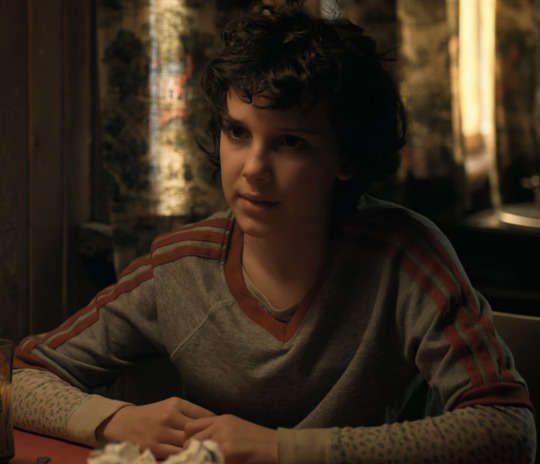
even el is wearing similar colors to the rest of the boys, another clear sign that she is "in" the party too, despite being away from them. they did something similar in the previous episode as well, where the boys + el wore matching costumes (boys were ghostbusters and el was a ghost), while max wore a costume that didn't have her fit in (michael myers).
all of the current party members have the colors gray, red and/or blue that tie them all together in that scene, so max's yellow hoodie makes her stick out like a sore thumb. a side note is that mike and will are the only members to have all three colors on them, and matching color outfits between couples tend to be common in the show.
--
example two: in s3e1, the opposite happens. everyone in the party except dustin is wearing a combination of blue and/or yellow. dustin is wearing primarily green, which i will explain the meaning of in another post. all i'll say about it now is that the color green most likely has to do with being comfortable or confident in your own identity.


will, however, is a special case, because he was actually not wearing yellow in that scene, only blue and a stripe of red. personally, i thought it was to set up how will's growth that season wasn't completely about societal expectations regarding romantic relationships like the rest of his season group. his character arc was much more about having to grow up and understand change when he doesn't want to because of the trauma he'd experienced the previous seasons. this is actually also reflected in his clothes - will is the only one that season to not wear any new colors (he only wears the three primary colors -> red, blue and yellow) while the rest of the party got to wear both secondary and primary colors (mike wore teal, el and max wore many different colors, lucas wore purple, and dustin wore green + orange).
back to the party - in that scene, the couples also match each others outfits. mike and el's have the same color scheme, being mainly blues with a small hint of yellow, and lumax having the perfect blend of yellow and blue together. this may be a stretch, but its a possible hint to show that lumax fit together, while mike and el don't.
the party members that were dating each other wearing yellow that season was to show their attempts to act normal via relationships. season 3 was also the one that the duffers kept referencing as the summer of love, despite all the couples that season being dysfunctional.
--
examples three and four: now, we're at the section of mike wheeler, my favorite closet case. he is the main reason as to why i noticed that there was a small pattern with the color yellow being used in the party's wardrobe.
i think we've all noticed that mike has a tendency to act very... straight when he's wearing the color yellow as his main color. this can be seen in both s3 and s4, especially during the episodes where mike is hyperfocused on his relationship with el.


when mike was wearing the first outfit in s3, he was searching for a way to make it up to el because he lied to her. though he was trying to act normal or learn to be normal for their relationship, he wasn't doing a great job of it. during that entire section, mike was going through the motions of learning how a straight man is supposed to act, with lucas by his side giving constant straight man advice. he was also not getting it.
now, onto what is possibly my favorite outfit in the entire series - mike's s4e2 outfit. first of all, he's wearing a yellow shirt over a purple undershirt, presumably for el because that's her favorite colors apparently. obviously, mike is not himself in this outfit, but he's trying to fit into this california tourist look for his girlfriend.
in this outfit, mike was trying extremely hard to only focus on being el's boyfriend and not will's best friend. we know how that went, and this outfit helped us realize how badly mike was doing trying to follow that mindset.
before s4, we were never given any indication that mike's style would be like this. michael wheeler should not be wearing an outfit that has a yellow hawaiian shirt, the color purple, a visor and sunglasses, and flip flops to top it all off. it doesn't fit his normal style that he's normally been shown wearing throughout the show, being button ups, polos, and for that season, black jeans and chuck taylors.
he was intentionally put in an outfit that did not follow his true identity. the shirt, thus the outfit and the het identity that mike was attempting to fit into, was literally called a "shitty knockoff" by argyle.
------
i'm positive there are way more examples that can be used, but these are the ones that stuck out to me the most. i'll leave off with some ending thoughts:
we as bylers have always considered will's main color to be yellow, but from what i've noticed in each season, the majority of his outfits have blue, same as mike (matching couple's colors)! in fact, s4 was the first time where the majority of the season had will wearing yellow, probably because of how he was dealing with his crush on mike at the time. i'd like to point out that the main colors that lucas and max wear are also the same, being red.
i'd love to do another one of these, the next one probably being about the color green because i think i have a grasp on the reasoning behind that color. other than that, i still really need to analyze the colors of their outfits again because i think the party's clothes specifically are most indicative of their behavior. since they are the youngest group, they are the ones who are the most volatile and it's reflected in everything, especially their clothes!
#stranger things#the party#byler#<- target audience#this analysis is for the byler nation#byler theory#byler analysis#st analysis#byler proof#i'd love to do more of these honestly#it's fun as hell#not art#sammi's brain was used
80 notes
·
View notes
Note
help i need to know why you hate season 3 of mtl. it’s my personal fave however i know it’s very divisive amongst fans (s2 is literally perfect though agreed on that)
SEASON 2 IS PERFECT NO ONE CAN DENY THAT
ok so many issues..and i’ll say i’m not counting the first episode or obviously doublebookedklok bc those two are SO good, match the normal tone, AND are so important to the plot.. they are fully excempt from my critique
but some of the biggest issues i take:
there is a very weird vibe shift in season 3 to me, it feels overall so much mean spirited? idk there is a feeling of so much love and care in the first two seasons—in the writing from the creators and within the band themselves (in their very stupid Them way ofc). season 3 just. doesn’t feel that way? i wonder if the team was going through shit with adult swim at the time that manifested in a more spiteful tone overall? idk the band just doesn’t feel like the dysfunctional family they usually are in a lot of the episodes in season 3 and personally… it just feels like a loss. murderface is treated so much stupider than before to where it genuinely feels like they all dislike him, skwisgaar is lowkey forgotten as a character other than Guy Who Fucks (except ofc fatherklok which i also enjoy). rehabklok is undeniably also very good bc the music SLAPS and it’s fun to see brendon go full on theater kid with it, but even still — the band’s treatment of pickles is SO out of character too?? in season one they all lost their minds at the thought of losing pickles even temporarily to snakes n barrels, had to get wasted to watch him perform with them? but now he’s in rehab and they don’t give a fuck and replace him with a robot? HELLO??? i choose to interpret that episode as actually just a manifestation of pickles’ personal worst nightmare
THE PLOT.. WHERE DID THE PLOT GO? obv it’s a show where the overarching storyline is always the backbone and not the fronting part of the story line, but we had episodes twice as long as usual, and there’s barely any tribunal? we could’ve done soooo much more with that time was salacia just on vacation? in the same vein, i feel like the pacing within episodes is.. off?? the writers are SO good at fitting soooo much into 10 minutes, it almost felt like they didn’t know how to fill time, and scenes linger longer than they should, the comedic timing is not quite right, it’s just OFF
the two episodes i reeeeally hate are fertilityklok and dethsiduals…. they both just like epitomize the tone shift that doesn’t work for me. there’s something profoundly uncomfortable about fertilityklok to me that i can’t place, it’s just so unpleasant imo like everything about it lmaoo. i also .. don’t like that being back to back with fatherklok for skwisgaar it just feels like we got really good character insight and growth for him, and then.. COMPLETE shutdown. guy who fucks, that’s all (i’m also obv very very partial to skwis so biased haha). dethsiduals feels like THE most hateful toned?? i don’t like how anyone behaves in that episode lmaooo it’s just so OFF, all i can say can be summarized in vibes are OFF
i also do actually like the rockzo episode as well tho uh… y’know some things could be different (14???? come on man) but i actually enjoy all the rockzo episodes bc they always bring out interesting parts of toki. i love that we got more childhood toki insight!! a highlight for sure. and then uhhh dethhealth is one of the better ones as well - i think it suffers from the off pacing, but it still feels more like the past seasons AND toki’s cat song is a certified banger that gets stuck in my head all the time STILL
ok that was fr so many words that didn’t necessarily need to go this long BUT obv i have been needing to talk about this for years lmaooo tldr i wish they’d stayed truer to the tone and characterization set in the first two seasons, and REALLY wish they’d utilized the time better for the actual plot
#also think abigail should’ve been introduced in season 3 BUT that’s a whole nother thing#thank you for asking :’)#dat ask#metalocalypse
14 notes
·
View notes
Text
Just Know I Learned to Hide It Well Part 2 (Brian/Justin WIP)
This portion takes place right after my previous post and is still Brian POV. If he seems out of character know that it’s intentional since I feel the writers really dropped the ball on his emotional growth by s4.
But then, Vic died, and everything got pushed to the side in favor of making sure Deb and Mikey felt supported in their grief. Vic’s death hit me hard, but I still couldn’t admit that out loud to anyone. So, instead, I used my blunt but honest way of speaking, which got me thrown out. I had hoped Justin would leave with me, but even he seemed angry at me. My head spun, trying to identify if he was mad at me or the world in general.
That night, instead of going back to Babylon and picking up a trick like I so desperately wanted, I stayed in my loft drinking Beam and trying not to think too much about all the pain around me. I wasn’t sure that Justin would come here after he was done at Deb’s, but my heart hoped for it. In fact, I couldn’t stop myself from continually looking over my shoulder toward the door as I pretended to work on an upcoming campaign for Eyeconic Optics.
Around midnight, my door slid open, and Justin came in without a word. By that time, I had retired to my bed with a joint and a bottle of water. I was still thinking heavily about what Ted had said the day before. Justin fits himself into other people’s worlds instead of making his own. I thought about how Justin was currently camping out on Daphne’s couch instead of using his Rage money to rent an apartment of his own. It seemed as though Ted’s observation had been right. I just couldn’t figure out why Justin refused to make a world for himself.
Justin scrambled onto the bed and wordlessly took the joint from my fingers. He leaned back on his pillow and exhaled smoke. It lingered in the air between us as I continued to ponder Justin’s motives and desires, and he lay there deep in his own thoughts. Then, I heard a sniffle from his side of the bed, and I turned.
Justin was crying. Not the typical quiet tears that you’d find in someone who’d lost a person they knew but weren’t extremely close to. I knew Justin had lived with Vic when he was at Deb’s right before the bashing, but I’d never gotten the impression that the two had bonded all that much. But here he was, sobbing so hard his nose was also running. Without another thought, I pulled him against my chest and held him close. I let him cry until he was ready to talk or sleep, whichever he preferred.
Justin eventually pulled his arms up to wrap around me and squeezed us closer together. The young man seemed to be unable to stop his emotions from spilling over. Not for the first time, I wondered how much of this was related to Vic’s passing and how much was an emotional release regarding his past trauma. (Don’t get weird on me. I do know certain psychology terms. In fact, I see a guy every once in a while who offers me a few insights.)
Finally, Justin turned his head so that he lay against my chest and stared toward my closet and attached bathroom. His fingers started to doodle things on my arm as he tried to steady his breathing, most likely muddling through his thoughts to create a coherent sentence. I let my hands run up and down his back, hoping it would help him calm down.
“Deb’s still mad at you, by the way.” Justin finally muttered.
I groaned both at how stubborn Deb was being and at Justin’s refusal to open up about anything of importance. But, then again, he learned from the master – me.
“You know, Vic would agree with me. He was damn lucky to have been given those years. And I’m not going to take back my words to make someone feel better.” A silence fell between us before I added, “But I’m sorry you had to face the family alone.”
“It wasn’t so bad. I mostly sat in the kitchen while Em flitted around making food.” What he didn’t say, but I knew to be true, was he sat in the kitchen because everyone crammed into the living room was too much for him.
Justin started to kiss my neck and then pulled back my shirt and kissed my clavicle. I knew where he was headed, so I stopped him. I didn’t want to have sex. I tried to get him to talk. But I also didn’t want him to think I was rejecting him because that would make everything that much worse.
“I was thinking. What would you say to have half of the closet back to store your clothes? And why don’t you set up a space here for your art? I could get you whatever you need.” My eyes followed his every move as he processed what I was saying.
“Are you asking me to move in permanently?” Justin looked like he wanted to bolt. Before Ethan, that question would have been enthusiastic; now, it just made him uneasy.
“I’m saying I want you around as much as you can handle. I want you to feel like you belong here because you do.” I rubbed my hand up and down his back in comfort.
Justin bit his lip and looked around the loft. “But this is your place. I don’t want to be in the way of your tricks.”
The tail end of his statement stung a little. I know he meant well because I did still occasionally pick up tricks. Mostly out of boredom while I waited for him to get off the graveyard shift at the diner. But I digress. Ted’s words echoed in my mind as I worked out the right words to say to keep him comfortable.
Have you ever considered that Justin molds himself to fit into other people’s worlds instead of demanding that others fit to him?
“What would make you most comfortable when you are here? I don’t want you to ever think you are in my way. Because you’re not.” I made sure my hand was on his back as I spoke to him to be sure he knew he was loved and wanted.
“But you don’t want me to move in.” Justin’s tone was broken and forlorn. I truly didn’t know what to make of him in this state.
“I didn’t say that. I am simply giving you control over what you want. I know you don’t want to be alone, or else you would’ve used your Rage money and gotten your own place instead of crashing on Daphne’s couch. If you’d much rather be here, I’m telling you that I wouldn’t mind it either.” I moved my hand from his back to his cheek, cupping it gently as my thumb rubbed his skin to soothe his racing thoughts.
“Can I decide later?” Justin whispered, turning his body away from me. It was a sure sign that he wasn’t in the mood to continue our conversation. So, instead of responding, I reached out and pulled him back down so that we were lying in each other’s arms once again.
I rubbed my hand through his hair as I felt his breaths even out against my chest. My mind was still racing, unable to stop. I wanted Justin to open up, but it seemed that all the things that had happened between us in the almost 3 years since we’d met had forever affected his ability to fully trust what I was saying to him. I will never admit it out loud, but that hurt more than him leaving me for the fiddler.
Eventually, I fell asleep, soothed by the sound of Justin’s breathing and the weight of him.
—
Two days after Vic died, Justin seemed to have perked up a bit. He was back to joking and laughing. He’d even given me an answer about making my loft a bit more of a joint space for the two of us. He’d done so by bringing his computer back to the loft along with a small desk that he’d bought for himself. Justin still hadn’t brought any of his clothes or personal care items, but I knew that the computer was a huge step toward him being with me more permanently.
We were enjoying an after-work sex session. It was so nice to finally feel the tendrils in my mind unfurl at the mere touch of the one person I would ever allow access to my body more than my standard couple of times. Justin was the only person I would ever allow inside the walls that guarded my most intimate thoughts and feelings. He was the only one who knew every inch of me better than even my most favorite of tricks.
“Uhh, Brian?” Justin repositioned himself away from my cock midblow job.
I looked down at him without adjusting my position. Looking at him through my lashes was always something that I kept stored in my memory to look back on when I was jerking myself off, and he wasn’t there. Only, this time, he wasn’t shining up at me with his usual enthusiasm. This time, he was looking at me very concerned. That alone forced me to sit up, putting a bit of distance between us. Something was up. My mind immediately jumped to Justin, deciding he wanted to leave me for good this time. It didn’t matter that this particular thought was extremely irrational, considering what we were in the middle of doing.
I couldn’t find my voice, so I simply raised an eyebrow at him in question. Justin got the idea and immediately started to speak once more.
“Were you aware that you have a sort of lump on your ball?” Justin looked nervous as hell as if he expected me to lash out. Which considering my emotionally immature history, he wasn’t wrong.
“A what?” I managed to croak out. My mind raced with fear over what the lump could be. Lumps on body parts were never a good thing.
“A, um, lump. It’s about this big.” Justin held up his hand, two of his fingers connected to make a smallish circle.
I leaned forward and placed my hands on his shoulders, “No, but I promise I’ll get it looked at. It’s probably nothing.”
I then got up and walked toward the bathroom. Justin had enough going on in his own head; he didn’t need my insane thoughts, too. But the young blond followed me closely. I knew he was probably switching into that annoying caretaker mode that he loved so much. I also didn’t have the heart to turn him away. Now that I was more open to admitting that he was important to me, I had found that I wasn’t as prickly about him seeing me when I was not my best.
“Brian?” Justin finally spoke as I leaned into the shower to turn on the water stream. I didn’t respond. Instead, I silently looked at him and nodded my head toward the shower. I wanted him in the shower with me even if I wasn’t ready to talk about the possible problem we’d just discovered.
Justin nodded silently, understanding, and rubbed his hand on my back as he followed me inside. Under the water, we both looked at each other before connecting our mouths in a way only the two of us knew. Feeling the love and support ooze from him with every move of his mouth on mine reminded me why it was never a challenge for me to agree to only kiss him on the lips. Even when we were broken up, I couldn’t bring myself to kiss anyone else because, after him, nothing was ever quite as good.
I was in the midst of washing his back when Justin finally spoke again. I knew he would eventually. If I was the epitome of walls and silence, Justin was openness and communication – usually.
“What if it’s cancer?” Justin’s voice was wet, and I knew it was from more than just the shower stream. Without responding, I wrapped my arms around his chest and pulled him against my own. I kissed the side of his head before I nuzzled his neck.
“Then, I’ll deal with it.” I finally whispered. “It’s all going to be fine.”
Justin turned in my arms so that we were now eye to eye. His gaze wandered across my face. “How can you say that when your dad died from cancer?”
I kissed him again, this time on the forehead. “Sunshine, my father ignored his health, and so the cancer spread beyond the point of help. I swear, when we get out of the shower, I will call my doctor and see what he says.”
“On a Saturday?” Justin looked unconvinced.
“You know, most doctors still practice on the weekends.” I ruffled his hair and reached behind him to turn off the water.
“Can I go with you?” Justin asked, his voice soft and timid.
I tossed his towel at him and started to dry off my own body as I thought over how I wanted to respond. If this had been before our breakup, I wouldn’t have even hesitated to push him away from something so intimate. But now we’d been through hell and back together, and for some reason, I found I could trust him better than I ever did Mikey. I found my heart aching for Justin to be there while I got the news, one way or the other.
“Sure.” I shrugged to make it seem like this wasn’t as monumental for our relationship as it was.
“Seriously?” Justin lit up like I hadn’t seen him do in weeks. He bounced up and down, pulling on my arm.
“Don’t make a big deal out of it, or I will retract the invite.” I rolled my eyes and turned to my closet to change.
By the time I had carefully selected a comfortable pair of jeans with one of the soft t-shirts I never wore out in public and had called my doctor to make an appointment, Justin was sitting at his computer, dressed and already immersed in some kind of art piece.
I smiled to myself while watching him work. His intense focus whenever he was creating made my chest ache in the most comforting way. I’d long wondered why he did that to me in the midst of art, but I was too terrified to put it into words.
I walked over to his desk and leaned over to nuzzle his neck once more. The smell at the point where his neck and shoulders met was always my favorite. It put my mind at ease every single time, though I would never tell him that. Or maybe I will someday.
“Monday morning at 9. What are you doing?” I finally asked, trying to gauge how committed he was to attend my appointment with me.
“I have a class, but honestly, I can skip it. It’s art history, and let’s just say I already read the entire textbook.” Justin turned slightly to kiss my nose with a smirk.
“Of course you have.” I roll my eyes, pretty sure Justin could detect that I did so fondly. “What do you say about going to the oncologist with me?”
Justin turned his computer off and gave me his full attention. I stepped back to give him room to get out of his chair. I watched him, nervous that he would go back on his offer. Even if I would never say it out loud, I was scared, and the idea of him being there made me happier than I ever thought possible.
“You were serious about letting me join you?” Justin looked incredulous.
“I never say or do anything I don’t want to.” I shrugged as if my response was remotely close to satisfactory.
Justin approached me, a smile growing on his face, and he wrapped his arms around my neck, locking me in place.
“Of course, I’ll come with you.” Then Justin laid his head against my chest, and we just stood there in silence for a bit. It was nice just existing with him. No expectations needed.
We spent the rest of the weekend dividing our time between Justin’s work hours, family obligations, and Lindsay begging me to come to the park with her and Gus. By the time Sunday night rolled around, Mikey was at the loft begging me to go to Babylon with him while Justin was across the room working on a project for school. Despite them making demands of him, I was glad Justin had finally decided to go back to school.
“Come on, Brian!” Michael whined. “You haven’t been to Babylon since before Vic died.”
“I’ve been grieving.” I deadpan, my gaze sweeping over to Justin, who snorted just as I finished speaking.
“Sure, you have.” Mikey looked between us enviously. Then he leaned over the kitchen counter so he could whisper to me without Justin hearing. “I thought you guys were keeping it casual.”
I look at Michael and then shake my head, “Mikey, what I do in my own time is none of your business. If I want Justin to suck me off all weekend long, then I’m allowed to. We are both consenting adults.”
“Barely,” Mikey whined again. “You never come out with me anymore.”
“You have your own hubby and child now, Mikey. I wouldn’t want to take you away from them.” I snark in a way that I hope will get Mikey to leave. The longer I watched Justin create, the more I wanted to make him come undone on my bed.
“They’re at some HIV group thing tonight.” Mikey shrugged. “Come on, I’m sure Babylon is much better than just staying home with him.”
Justin got up from his computer and stretched his arms above his head. Then, he brought his hands together to massage his damaged one. I strode from the kitchen, ignoring Mikey’s jab at Justin. I gently took his hand in mine and started to massage it like he always liked. Without a word, I knew the pain was slowly receding as he looked into my eyes, and we silently communicated.
“Mikey, my answer is no. Please leave.” I responded after some time, still not taking my eyes off Justin.
We heard the door open and then slam close. My eyes never once left Justin’s, which means I caught when he ever so subtly relaxed in Michael’s absence.
“You know he’s just…” I stopped myself, unsure how to explain what Mikey was doing.
“Brian,” Justin cupped my cheek to focus me, “It’s fucking Mikey. I never take what he says to heart. At least not anymore. He knows you’ll never love him, but he can’t handle you actually loving someone else.”
“Is that what you think this is, Sunshine,” I smirked and put my tongue in my cheek.
Justin didn’t respond, instead, he kissed me deeply on the mouth. I gave his tongue entrance, and soon we were wrapped up in each other, Mikey a mere memory. Before I wanted it to, the kiss ended. Justin smirked up at me and patted my bicep.
He walked back toward the desk to continue his art but turned slightly to respond, “Whether you want to admit it or not, you love me.”
And you know what, I do. Woah, that’s a terrifying thought.
The next morning, Justin was up long before our joint alarm, so I knew he was just as nervous about this appointment as I was. I was never a naturally comforting person, so I was at a loss for how to reassure him while my own fears were building up. My mind turned to Deb and how she always seemed to know the right thing to say. I couldn’t come up with anything. Instead, I got up and found him staring out of the bay of windows. I quietly walked up behind him and wrapped my arms around his torso, letting my chin fall on his shoulder. It was one of our favorite ways to comfort each other without speaking.
“What if you have cancer?” Justin’s question from a few days ago comes out of his mouth once more. He says it very quietly with as much caution as I’ve ever heard in his tone.
I squeezed him even closer to my chest so he could feel my heart beating against his back. Then, with a kiss on his neck, I responded.
“Then I’ll have cancer. What’s one more thing for us to handle?”
Justin fell silent once more, but I didn’t push him to respond. I wanted him to process all his thoughts and then speak to me.
“Maybe I shouldn’t go today. If it’s bad news, you’ll want to sit with it for a while before you tell me. Like always.” Justin shrugged away from my embrace and plopped down on the couch. I ran my hand down my face before I turned around to face him.
“I wouldn’t have told you to come if I didn’t want you there.” I didn’t sit down; based on Justin’s body language, he needed some space right now. “I know I’ve been guarded in the past. But, I thought we were past all that after what happened with Stockwell.”
Justin sighed and then looked up at me; his eyes were brimming with unshed tears. He angrily wiped at them to make them retreat. Something was bothering him, making him emotionally vulnerable, but he didn’t want to talk about it. I needed to do something fast if I hoped to salvage what little ground I felt we had made since he found the lump. I crossed the room in three quick steps and sat down, angled toward him with our knees making contact.
“Justin, what’s going on?” I reached out to hold his hand, but he moved it away.
“Ever since I was running around with Cody, I haven’t been able to get Chris Hobbs out of my head, and then my thoughts morph into a version where you break up with me.” He paused to take a few deep breaths. “I know in here,” he pointed to his chest, “That you wouldn’t do that. Just like you wouldn’t stop me if I left. But,” He shrugged and stopped speaking. It was as if he’d lost his nerve.
Then he pointed to his head, “But up here, it tells me all the time that I’m a waste of space. That you think I’m always in the way. That no one really wants me. After all, if my parents, who are supposed to love me no matter what, could abandon me, how can I rely on anyone else?”
It was the most he had ever spoken to me about his mental health and how he felt. I knew that in the past, I hadn’t been very receptive to feelings or emotions. It made me feel good knowing that he now trusted me to hear his issues and not react badly.
“Sunshine. You are never a waste of space, and I will never think you are in the way. I l-” I faltered on that one four-letter word that came so easily to so many but not to me. “I care about you. I have for a very long time.” Then I pulled him into another hug, this time I made sure he could feel every breath I took.
“Let’s get ready for my appointment. I figure we could have some fun in the shower.” I winked at him with a mischievous smile. Justin just shook his head and smiled at me.
7 notes
·
View notes
Text
My Views on Redemption
A while ago in a discord I posted this:
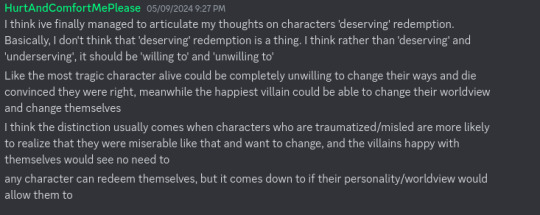
and then, a few minutes later:
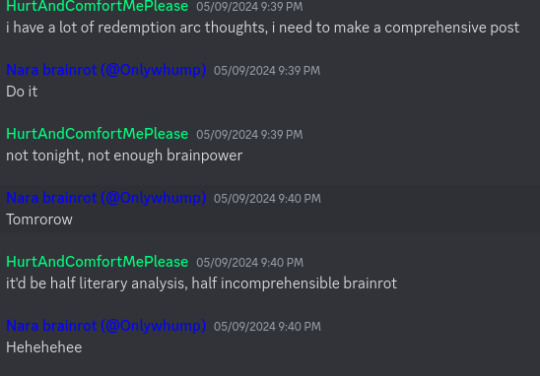
So, @onlywhump , this is for you.
So what do I, an amateur writer, have to say about redemption?
A lot. The answer is, A Lot.
Let's start off with an explanation of what a Redemption Arc even is, because a lot of people don't really seem to understand;
I consider there to be four Arcs; (In simplest terms)
Redemption Arc - A bad person becomes a good person.
Realignment Arc - A good person from a bad place moves to a good place.
Reclamation Arc - An external factor made a person bad against their will, but they become good once again of their own volition.
Atonement Arc - A bad person repents for their actions and accepts the consequences without reconciliation.
These Arcs can be combined, or can be distinct. The differences lie in the conduct of the character undergoing the arc.
I will say this now, and I will say this later, too, in order to need redemption, a character must have done something horrible in their past. If your character wasn't ever bad, then they don't need a redemption, they need either a realignment or reclamation Arc.
Secondly, Forgiveness =/= Redemption, however forgiveness is often part of redemption stories due to its signalling that both parties have grown and moved past their mutual past. Obviously forgiveness isn't something to be expected of a victim, however in fiction it is often seen as closure for all involved.
Thirdly, there is no such thing as 'deserving' redemption. Redemption is not something that is given, it is something that is done. Everybody deserves to be a good person, the only thing that matters is if a character is willing to do what it takes to become a good person.
Fourthly, a redemption arc is not punitive by definition. Redemption is an interpersonal journey that results in mutual positive growth and reconciliation. If the character is punished for their actions and that is the end of it, it is an atonement arc instead.
Now, let's move onto what I feel to be the building blocks of a good redemption story:
Number 1: Backstory and Characterization
I believe that the single most vital aspect of a redemption arc is the characterization of the character being redeemed. When deciding if a character should be redeemed or not, you must look at their personality and see whether or not they are the type of person who would be willing to subject themselves to the humiliation, upturning, and reconstruction that comes with true positive change and taking responsibility for their actions.
That is not to say that a character's personality and views cannot change, but where they start is just as important as where they end up. When writing a character, you must consider what could convince a person to change, and what it would take to make them completely alter their worldview. It is also important to consider how the character came to those ideas, and how deeply ingrained they are.
If a character is unwilling to accept that they were wrong, don't care if they were wrong, or hate the heroes enough, they may be completely unwilling to even consider redemption. This can be true no matter who holds these views.
At the same time, if a character is willing to understand their wrongdoings and weather the storm of growing and getting better, then they are the ones who would end up redeemed.
There is no one-size-fits-all path for redeeming characters, as the nature of redemption is highly personalized. A character who is prideful and vain will have a much different path than a character who is more introspective.
Another important factor to consider before committing is support. People need support in order to improve themselves, and whether or not a character has the support they need can alter their paths considerably. Does the character leave everyone they've ever known behind in order to redeem themselves? Do they have a relative/friend on the side of good who is willing to help them? What does the character think of this?
A character without the aid of others may be liable to relapse, become morally or ideologically lost, or fall down a different spiral. This is natural, and falling for something does not mean that a character is irredeemable.
Finally, let even your most horrible and heinous characters have distinct and likable qualities. Let them be funny, let them be creative, let them be passionate, that way when they redeem themselves, those traits can shine through even brighter.
Number 2: Guilty Beyond the Shadow of a Doubt
I said it earlier, and here I say it again; If a character hasn't done anything wrong, then they don't need to be redeemed. If a character was always a good person, just on the wrong side, then it's a realignment arc. Your character MUST have done something horrible in order to warrant redeeming themselves, otherwise it's unnecessary.
What exactly the character has done while they were a villain is up to the writer, but know that whatever they have done MUST be addressed, and the severity of the event in question will directly effect the lengths the character must go to in order to redeem themselves.
Questions to consider:
Was it personal? Did the character do something specifically to spite someone else? Why? Who was it?
What was their goal? Did they achieve it?
Was it planned, or spur of the moment? Was it in a fit of rage, or carefully calculated?
How did the character justify it to themselves when they committed it? Do they consider themselves to be in the right?
What are the long-term ramifications of their actions?
How do others view these actions? Both heroes and villains?
These may help inform a reference of what the character has done, and what effect they have had on the world around them. This world of their own creation will be the obstacle that the character navigates during their redemption.
Number 3: Turning Point
In any redemption story comes the point at which the character in question comes to realize that they need to make amends for what they have done. There are a million ways to do this, and all of them are highly specific to an individual character.
Bottom line, this is the point at which the biggest change will occur. It will not be as easy as flipping a switch, it may take a lot of back and forth for a character to come to the final decision to change their ways. A character may even double down on their actions for a time in order to pretend that they don't feel guilty about it. Depending on the mental state of the character, one could expect a lot of self-hatred and bitter regret.
At the end of this point, the character will have to make up their mind as to whether or not they want to continue down the path they currently walk, and if they decide not to, then that is the first step of redemption.
Number 4: Growing Pains
It will not be a smooth ride. Growth is uncomfortable, it is sometimes painful, as will be the circumstances.
If a character has to leave their entire life behind, there will be a brief rock-bottom phase. Maybe nothing works at first and the character is convinced they've ruined their own life for nothing, but persistence is key. Again, how the character reacts to their new surroundings is entirely up to the character themselves. There is no set path.
Relapses are also powerful, a character may temporarily slide back into their old ways and sabotage themselves if they are stuck in a rut they don't feel they can escape.
Learning to deal with new and upsetting emotions such as guilt, shame, and self-loathing is to be expected, the character may struggle hard against these feelings. I'd almost liken it to the 5 stages of grief, but instead it is the 5 stages of guilt or something.
Depending on the ego of the character, they may even slip into the trap of blinding envy, inane jealousy of others who live without crushing guilt, or who are beloved when they are hated. They might even become actively self-destructive if their emotions become too much to handle, or they don't have the support necessary to properly express or process it.
But, that is not to say that it is only pain all the time, rather it is a rollercoaster of highs and lows. They might help save the day and be accepted by new people, and then they might make a selfish decision and cause a rift between them and the heroes. Really, as I have stated multiple times now, it depends on a number of factors.
This is the part when both a character's flaws and strengths are at their most potent, and using the strengths to work through the flaws is the goal. The flaws are not there to be undermined or defeated, they are there to be worked through and put to rest.
Number 5: Relationships and Forgiveness
To preface, I am aromantic/asexual, I am by no means a person to talk about romantic relationships, so I will keep talk of that to a minimum.
Relationships, old and new, are very important to redemption stories. Letting go of relationships and forming new ones, or reconciling and regrowing a relationship are beyond vital to positive growth. People need support, and with it they can open up and find a better way.
Ex-villains should be allowed to love and be loved should they find people willing to do so with them, relationships aren't exactly something to be deserved. Once a character becomes more likable, people will start to like them.
I say this now, as redemption and relationships/forgiveness can be a controversial discussion, that villains in stories are more often that not metaphors for real life happenings, and aren't meant to be taken at face value. Let it be known beyond the shadow of a doubt that what I am saying in this entire spiel is about fictional characters.
Forgiveness is not something that will be quick. Again, I say for the umpteenth time, it depends on the characters involved. Listen to your characters, what they want, if and how much they care about each other, and whether or not the character is the type of person to forgive at all.
Generally speaking, in redemption arcs in media, especially in media aimed at children, are often more simplified, and characters very frequently become friends with old enemies. This is typically because those shows are meant to be educational, and kids should be encouraged to apologize, make amends, and forgive each other. There is no problem with this.
Whether or not a character should be forgiven isn't exactly something I can explain here, it should depend on the themes of the story, the other characters and their arcs, and countless other factors. Forgiveness signals closure, and that closure may come in phases, don't feel pressured to rush it, let it come from the characters naturally.
TL;DR, Character is fate.
#story tropes#whumpblr#emotional whump#whump writing#whump community#redemption arc#writing tropes#tropes#character tropes#book tropes#holy shit this took me like 3 days to write#I accidentally deleted it when I was halfway through it and almost gave up altogether
29 notes
·
View notes
Note
What are your least favorite seasons for each of the main characters? Season 8 doesn't count for obvious reasons.
Hi! 😀
I'm going to start with favorite then least favorite (because I totally misread your ask 🙈).
Favorite
Red: Season 1.
Red's still gruff but more complex. He demonstrates his love and compassion for Eric directly in "That Wrestling Show" and "Grandma's Dead" without being emotionally constipated about it (that's a term I use for Hyde, too 😂). Same with Hyde in "That Disco Episode" and "Career Day". But he still does so in-character. After S1, the writers replied down on him being a hardass. Perhaps some humor was gained, but more was lost imo
Kitty: Season 2
Kitty shows her strengths and vulnerabilities this season. She is the sole breadwinner while Red's out of work and supports him through his emotional crisis about his joblessness. She becomes depressed at Eric's growing up (i.e. when Eric and Donna begin their sexual relationship).
Eric: Season 2
This choice was a little tough for me because I love how good a friend he is to Hyde in season 1 and how strong he is in season 5. But in season 2, he must learn to balance his ego, his insecurity, and his wants vs. respecting Donna and their relationship. Unfortunately, he doesn't learn the lesson fully enough.
Donna: Season 3
Donna grows in independence this season while her relationship with Eric remains an important part of her life. Eric's insecurity and resultant controlling actions ultimately push her away. I stead if pushing her anger (and wants and self) aside to protect Eric's ego, she finally puts herself first in a non-selfish way --
Except for her utter disrespect of Eric in "Backstage Pass" (which is the accumulation of her understandable resentment of him for trying to control her and hold her back; story-wise, it makes total sense and is completely set up for by the writing all season).
Jackie: Season 5
Jackie grows and changes significantly in this season. From bossy to communicative. From living in a superficial fantasy to appreciating the depths of reality. Hyde encourages her independence and ability to take care of herself financially as an adult -- and thus encouragement happens before she's forced by her parents to be financially responsible for the family's estate as a minor (her parents left her without any kind of adult guardian, family member, godparent, nothing).
She discovers her true strengths but overcorrects. She has to (re)learn how to let people support her.
Hyde: Season 2
Hyde's protectiveness of and support for Jackie in this season is e v e r y t h i n g . He starts helping her not because he likes (he doesn't and finds her personality abrasive) but because she's heartbroken and vulnerable and he believes helping her is the right thing to do.
Kelso, of Hyde's best friend, is not only responsible for Jackie's emotional state but also punishes her after she refuses to accept him back as her boyfriend. Hyde not only tries to get Kelso caught by Jackie, he also teaches her a method of protecting herself from bullying -- making himself more vulnerable to her by doing so (i.e. sacrificing some of his own mental-emotional safety for Jackie's).
Fez: Season 1
Fez isn't a joke but a complex character who's emotionally insightful. He's someone who's learning how to fit in with his American friends and sometimes overshoots. He doesn't yet suffer from Nice Guy syndrome and genuinely treats Jackie with kindness. He has the awareness and respect not to try to steal Jackie's affections for himself, despite believing he could.
He calls Kelso out on his bad behavior. His bond with Hyde is well-written, too.
Kelso: Season 6
Kelso demonstrates the most growth and change in this episode -- where Brooke is concerned. He leaves Jackie and Hyde alone now that he's interested in someone else (a selfish, self-interested release). He's still selfish with Eric and Donna, taking their toys without permission and destroying them. He tries to sabotage Eric's waiter job at the Holiday Hotel out of a sense of entitlement.
He doesn't reciprocate any of the friendship and support he's given except at the very beginning, trying to undo the damage between Jackie and Hyde he's partially responsible for.
All of that being said, he works hard at maturing for Brooke to prove himself a worthy romantic partner and father. He chooses a stable, albeit potentially dangerous, career. He respects Brooke's boundaries (although he does try to push them a little), and he ultimately lets Brooke and his child go because he believes that's what's better for them: his most unselfish act in the show.
Least Favorite
Red, Kitty, Hyde, Fez: Season 7
These four are almost unrecognizable from their canon selves in too many episodes. Fez is the worst written of the four. He's reduced to a punchline and punchline giver -- and his disrespect for women a d female friends is firmly cemented. (This transformation began at the end of season 4.)
Kitty is devolved from her intelligent, compassion character to a dumbed-down, alcoholic whose fear at Eric growing up and leaving home is transmuted into hostility and resentment toward Donna (but this transformation began in season 5).
Red is changed from someone deeply in love with his wife and has eyes only for her; has no interest in other women sexually, to the point of feeling guilty and scared when a teenage girl hits on him despite all his efforts to turn her away; to someone who acts like a put-upon husband in a terrible marriage, finds joy (and possible lust) in posing with two much younger car models.
Hyde goes from someone clearly deeply committed to Jackie in seasons 5 and 6 to someone who is now commitment-phobic, disrespects Jackie utterly in "Winter" and after she graduates high school. Breaks promises to Jackie. Shrugs instead communicating with her properly. This Hyde is incompatible with seasons 5-6 Hyde except in a select few episodes where he's written in-character (e.g. "On With the Show").
Jackie: Season 4
Jackie vacillates between being supportive of Kelso's potential success and utterly jealous and resentful of it (and him). She chooses her love for Kelso over money, tolerates his lazy approach to finding a job, gets a humiliating job herself -- and while her envy at his modeling gig is understandable under all the circumstances, her treatment of him is unacceptable.
Kelso: Season 5
First, I have to talk about his behavior in season 4, which leads to his behavior in season 5. Kelso's misogyny hits an all-time high in the second half of season 4, as does his hypocrisy and sense of entitlement. He makes a false equivalency between Jackie's one kiss with Todd, which she is tricked into and tells Kelso about almost immediately, to his months of sleeping with at least two other girls with no intention of ever telling Jackie about it.
He also, hypocritically, tries to see Donna's breasts while he and Jackie are in a relationship.
He becomes paranoid and possessive, stalking Jackie at work. He blames his cheating on Jackie's supposed mistreatment of him. But the specific incident he cites is never shown on-screen nor spoken about in season 1 when he first cheats on Jackie with Pam Macy. He claims men cheat "out of joy" while women cheat "out of hate" and that "girls don't even enjoy sex".
This attitude and behavior carries over to season 5. Where in season 4, Kelso is decent to Jackie during the first half, he's awful to Jackie (and Hyde) throughout the whole of season 5. While he's allowed to sleep with whoever he wants, Jackie's "allowed" only to pine for him in perpetuity and get occasional sex from Kelso as a consolation.
Upon learning Jackie isn't going to abide by Kelso's controlling, narcissistic, self-entitled rules for her life and, instead, found joy with someone else -- worse, one of Kelso's friends, he dies all he can to destroy her happiness. Not because he's in love with her but because of his wounded pride.
Kelso feels humiliated that Jackie is in a happy, fulfilling relationship with Hyde. This fact translates into Kelso's mind into other people believing he's not the hottest, most sexually skilled man in Point Place. Therefore, he must "steal" Jackie back to prove he -- not Hyde -- is the hottest, most sexually skilled man in Point Place.
The above, coupled with Kelso's possessiveness of Jackie, feelings of entitlement toward her, and misogyny, renders season 5's Kelso a completely unlikeable and unsympathetic character. He should've been kicked out of Eric's basement long before season 5, but Kelso's behavior this season -- in the real world with the friends he has -- would have clinched his ousting from the group.
Donna: Season 4
While I understand Donna's character development in this season, and believe much of it is set up well by previous seasons, this is my least favorite season for her. She is in an incredible amount of pain. It makes her self-destructive but also outwardly hostile. She jumps into another committed (for her) relationship rather than talking the time to heal herself.
Donna disregards Eric's own grief to distract herself from her own ("The Relapse"), with no regard -- or care -- that this might deepen Eric's grief. Only her feelings matter to her in this episode, and it's written as if the audience is supposed to agree with her.
Dating Casey is a way to narcotize her grief. But she bullies Eric with Casey. She snaps at Hyde and rejects his friendship when he tries to protect her. She agrees with Casey's rapey advice to Fez about Rhonda.
Yet, as I wrote above, much of her behavior is grounded in the show's previous seasons. As much as I dislike how she acts, I believe most of it is in character because of the specific stressors she's under. It's a shame T7S's writers didn't give her a chance to self-reflect on her season 4 choices and gain emotional clarity from them (beyond, "I was so stupid!")
#that 70s show#that '70s show#eric forman#jackie burkhart#michael kelso#fez#steven hyde#donna pinciotti#kitty forman#red forman#ask#anon#meta#essay#my meta#my essay
19 notes
·
View notes
Text
Once again putting on my weekly Teddependent tinfoil hat...
Alright, with the ever important disclaimer that no, it's not likely to happen and it's never been likely to happen and it won't in any way be queer baiting when it kinda-inevitably doesn't happen out of the way, LET'S TALK ABOUT HOW "STRAIGHT" IS A MEANINGLESS DESCRIPTOR IN THIS CONVERSATION.
It's all about the ✨context✨
First off, as numerous posts have already pointed out, Ted is technically speaking in the past tense here: "back in the early days of my coaching career" was when he was a "straight fella." This obviously doesn't eliminate the possibility that Ted is still straight, but if he has come out as queer since then, acknowledging that would defeat the whole purpose of his story. He's not looking to come out during the halftime of an important match, but rather to emphasize how "normal" he was back then and, as a result, the ways in which he got creative trying to express his individuality. If Ted had instead gone, "Back when I thought I was straight but wasn't able express that part of my identity because I hadn't realized it yet and/or had been too afraid to come out in midwestern America" that's not only an iffy way to out your protagonist in a show that has treated queer rep very delicately this season... but also totally derails his story. Both in-universe (you want to give the characters time to react to this, especially a potential love interest like Trent who is in the room) and from a writing perspective (the whole point here is for Ted's story to impart the moral of the "right idea sitting behind a couple of wrong ones") then a coming out moment is going to fit awkwardly here and detract from the anecdote's purpose.
Thinking more broadly, do we honestly believe that Ted hasn't changed since those early days? This show is all about growth, so - for me anyway - describing a young, new-to-coaching Ted doesn't imply, "That's still a descriptor that fits him" but rather begs the question "How much has he grown since then?" Notably, two-thirds of what else Ted lists about himself is no longer accurate. He's not working in middle America anymore. In a linguistic twist, he doesn't have a career in "sports," but "sport." And though we have no idea (as far as I can recall) if Ted is still afraid of tattoo needles, he certainly strikes me as the kind of person who would work to overcome that fear, whether he actually wanted a tattoo or not. The Lasso Way, by default, impacts Lasso himself. And here I'm admittedly reaching, though I find it intriguing that Ted's potential growth is couched in a 'Close, but not quite' metaphor with that comparison. Meaning, Ted's point about his goatee is that he went too far and had to pull it back into a "Foxworthy." Kinda like how, living in midwestern American with all its expectations and homophobia, he might have gone too far into a 'I'm definitely, 100%, absolutely-no-doubt-about-it straight' identity only to later pull back into 'Actually? I'm bisexual.'
Notably, this is metaphorical change comes about when his best friend - Ted's closest confidant and the man he trusts most in the world, someone who is INCREDIBLY queer-coded - tells him a hard truth about what's "not a good look" for him.
On his wedding day.
Which he then proceeds to compare to eating Bigfoot's ass.
Like I said, reaching, but given the loaded metaphors in this show (Oh hey, what does it mean to label "sport" the metaphor and then gift Trent that nickname?) I honestly wouldn't be surprised if this was later reframed as more than just a passing joke.
However, the real point is that Ted has changed, a theme that's at the very heart of the whole show, but has been particularly prevalent the last two episodes. Trent freaking throws himself after Ted (WHAT A DORK) in an effort to explain how all these small, incremental changes have led to a monumental outcome - notably one that explicitly allows footballers and their associated club members to feel comfortable expressing all aspects of their identity, sexuality included. The idea that Ted has remained near-static since those "early days," growing only when it comes to what we've seen on screen (therapy, coaching, divorce, etc.) feels antithetic to the show as a whole.
Which brings me to the meta-y question of, "Why now?" Why, after nearly three whole seasons have we suddenly had Ted drop the "straight" bomb? Why is this coming after an explicitly queer episode with not one, not four, but FIVE queer characters re-affirming their queerness, coming out to each other, or coming out to the audience? One of whom is an older, thought-he-was-straight man who has only recently come out after being married to a woman? That's not at ALL the backstory fans were expecting for Trent and it just feels like a mighty big coincidence to me, giving us that surprising trajectory alongside a casual claim the next week that, 'The straightest straight character to ever straight has randomly reaffirmed that he's DEFINITELY straight (but with plausible deniability).' After all, the show never needed to address Ted's sexuality - the marriage and midwestern everything implied enough - and certainly his speech about individuality didn't have to use that as an example. Given how completely unnecessary it was, I'm inclined to figure that a) the writers - who I assume are fairly knowledgeable about fandom trends and fan expectations/desires - tossed it in as a way to let us all down easy (which is totally understandable and I'm sorry it didn't work on my part lmfao) or b) ... they want to lay the groundwork for a plot about Ted's sexuality. They want that nugget of implication to either undermine the, 'He's still straight!' assumption later, or take Ted through the process of questioning his sexuality now.
"But, Clyde, we only have 5 episodes left!" Yeah, fair, but the show also has a tendency to race through some development (in still satisfying ways) while allowing other aspects to simmer. Basically a Roy and Trent vs. Jamie situation. Jamie has had a series long journey, slow and steady to the point where it sometimes shocks you just how much he's changed. In contrast, outside of a little groundwork in season one, we introduced Roy's personal hatred of Trent, the motivation for that, their conflict, reconciliation, and budding friendship all in one episode. It is possible to do a lot of important work very quickly, especially when the show is potentially laying down hints along the way. That's why to all us queer folks, Trent coming out last episode wasn't in any way a surprise: we recognized the coding that was happening in the background. If Ted/Trent did somehow happen - either as an end-game romance or Trent acknowledging an unrequited crush - we'd likewise have a wealth of analysis going, "See! This has been in the works since 'I like your glasses'!"
(Btw, none of which is even getting into Trent's absolutely FERAL adoration of Ted this episode that reads like a crush the size of Kansas)
If I'm being honest, at this point in the series I don't think Ted is going to wind up with anyone. I never came into this show expecting my (back then) teeny tiny ship to have any chance of sailing... and really, I still don't. But I am surprised by - and excited by! - the potential the show keeps giving us, in a way that doesn't feel at all malicious to me. If (when) Ted and Trent part ways as just friendly dorks, I'll have come away from the series not feeling like I was delusional, but rather that the writers were saying, "Here, this is a cool concept. We like it. We support it! It's not what we personally wanted to write, but we're going to give you the tools to keep playing with that possibility." Which, you know, is pretty much what I'm doing right now.
So if hearing Ted say he's straight produced a little nugget of disappointment, take heart! Even if I'm just talking out my ass here, it makes for good canon-compliant explanations in fic :D

132 notes
·
View notes
Note
I'm dying to hear about "the lingering will is becoming a person and terra has to cope with that." (for the WIP game!)
hihi Cori!
Since I went into the general gist of things in the other ask I thought I'd pull a couple bullet points from my outline and talk about them here!! Since there's a few images and it got a bit long, I'm sticking it under the cut <3
first, straight from my notes:

I think one of the interesting things about the Lingering Will is the balance of being an object with being a person. It's a construct- a living suit of armor, hollow metal and magic. And yet it moves and thinks and feels, and ultimately chooses to sacrifice itself. I choose to represent that dichotomy with its pronouns- part of its personhood comes from its inhumanity, and i feel like It pronouns mesh well with that. Some people choose not to use It pronouns because they feel dehumanizing, but that's exactly why the Lingering Will uses them. Its inhumaness is an important part of it. There's less thought behind it also using they/them, mostly vibes. But it definitely prefers It/Its.
Next is a character interaction and dynamic I'd love to explore:

Roxas has direct, personal experience with the kind of thing Terra is dealing with. So since Sora isn't around, Terra reaches out to him. And despite how things are weird between them, because Xemnas (and Ven), it's a very earnest and personal conversation. Terra very genuinely wants to understand Roxas' perspective on finding his identity, especially separating who he is from Sora, and very few people have ever listened to Roxas.
For most of his life, people lied to Roxas about who he was, where he came from, his feelings and memories, even his friendships (im looking at you, DiZ & twilighttown.exe). So his point of view is very focused on honesty. Come what may, Terra should be honest with LW about what's going on, how he feels, what the possibilities are. He should never dismiss what LW has to say, and he should never lie to it, even to "spare its feelings". Now frankly Terra is a pretty poor liar so this isn't necessarily a problem, but it gives Roxas a space to express his feelings about what he went through, and hope that someone else will be treated better.
It's not all doom and gloom though- there's joy in becoming! Growth like that is beautiful and wonderful and so, so worth it. Having someone to lean on is so important when you're figuring yourself out, so Roxas also encourages Terra to be that person for LW. The little things can matter so much, and they're even more meaningful when you have someone to share them with.
This is the other character interaction I think would be really fitting:

Lea has had a pretty tumultuous time with identity and personhood himself. He understands that dissonance between Somebody and Nobody, or in Terra's case, Somebody and Construct. He also understands, in a way, what it's like to grow a heart where previously there "wasn't" one. And in being friends with Roxas and Xion, he's watched them grow up and change and figure themselves out. He's sort of the Terra parallel here, where Roxas is the LW parallel.
Their conversation is a lot more uplifting- Terra should be proud of LW and its growth, that all that heart business is just as or more complicated than it seems, and it's not a quick or easy process but the first step is the hardest. This is the space where Terra is able to confess his concerns and worries and be heard and understood, because Lea really does get it. Most of it, at least. He emphasizes patience and openness, because identity can be really messy, and he doesn't want someone to make the same mistakes he did.
(side tangent: Lea being one of the oldest active keyblade wielders is something I don't think people talk about enough in a serious capacity, because Nobodyness aside age does bring life experience that the others simply don't have. He's fucked up and burned out and hurt others and grieved and healed in ways others haven't purely because he's been around a little longer, and his life has been Messy. He also has a greater grasp of the weight of being a keyblade wielder because he made the active choice to become one, and had a different life to compare it to. So while things may be kind of awkward because of his past, he really does have some uniquely valuable perspective and insight to offer.)
Okay last one. The Lingering Will is a mouthful so i had to come up with a different name at least for convenience:

I thought a Latin word would go really well with TAV's theme, and I wanted to attribute an "element" to it too. So I went with Animus, or Soul/Mind, because that's kind of what a "will" is in kh. Xehanort calls the Lingering Will a "wretched spirit" and asks "why does your mind resist?" which also contributed. Frankly the metaphysics of a "will" are best left for the theoretical Lingering Will presentation I'll make someday, but I felt Animus covered those concepts while fitting the themes.
(also, I love The Adventure Zone: Balance, and the Animus Bell is a bit of inspiration as well <3)
Thanks so much for the ask Cori, and I'm totally down to talk about more! It's a great way to figure things out, really :3 One of these days I'll give it a proper go but for now it's just my doc and these posts lol
5 notes
·
View notes
Note
Oh would you so kindly expand on your Murray/that plotline™ thoughts? Btw I didn't remember it as a cheating situation but since it's been so long since watching that season i was taking other people's word for it. And yeah i don't think Murray did anything even if it was. like he didn't make them have sex.
I started to type out an answer to this ask, forgot to save it as a draft, and lost all of my thoughts, so apologies if this is a little disjointed but! I will do my best to give my thoughts coherently <3
I really do think the Murray thing is maybe a mischaracterization of his intentions, but also not the thing I care most about when it comes to narratives that deal with Steve/Nancy/Jonathan situation in season 2, because at the end of the day it's just another reframing of the same tired take tbh
I'll stick it under the cut though because I know I can be wordy
There's this, like, company line in this fandom that Steve and Nancy were just two teenagers who hurt each other, which I one hundred percent agree with, only that tends to be the company line everywhere except for the Steve-centric fics that get written about that plotline, which instead seem to frequently make an argument that "Nancy cheated on Steve, was cruel enough to cause long-term emotional damage, and then either is forced to grovel for forgiveness or be shut out of his and his friends' lives forever" which is. Not that. Right?
Fandom cultures at large, not just this one, are more willing to do empathetic, in-depth character analysis of male characters than they are female. This is something we know to be true and this is something that is noticable in how Nancy gets treated by fanon, especially when it comes to her relationship with Steve.
Because here's the thing, we could debate it all day (and I won't, for the record, if anyone's thinking about starting a fight) but for my part, what she did wasn't cheating. From the very first time I watched season 2 when it was released, I always read the Halloween fight and the morning after as a breakup.
HOWEVER, even if Nancy did cheat on Steve? It doesn't warrant the downright malicious Nancy characterizations that often feel ubiquitous to this fandom.
Even if Nancy did cheat, there is a refusal to look at the situation from her point of view, something which even Steve is canonically able to do by the end of season 2 (we'll get to that). Because there's more nuance here to take into account than just Nancy making a choice to specifically hurt or break Steve and there's more nuance here than Steve being incapable of moving on from this breakup.
In fact, if you really look at the choices both of them are making, it has very little to do with each other and everything to do with their own reactions to immense personal trauma and grief. Nancy has spent a year suppressing a mourning she's not allowed to experience out loud, and you expect her not to snap eventually?
Does personal hardship mean cheating is, like, a good thing (if that's the takeaway you're going with from canon)? No. Does it still wildly differ from the cruel and intentionally malicious version of Nancy that shows up in far too much fic? Yeah.
She's a teenage girl whose best friend died in a violent and preventable way at sixteen years old. Nancy tried to fit herself into Steve's coping strategies, tried to let it all go back to normal, and was visibly hurting in the process. She sought out comfort. Understanding. A chance to be heard.
It's a disservice to both of their characters to treat this like there's a "good" and "bad" guy, when the way they handle it in canon, the way Steve comes to terms with it (literally within days he is telling her to go with Jonathan, by the way), is all vitally important to their growth.
When Steve says "I may not be a very good boyfriend" that's not about him being down on himself or having low self worth, it's a moment of growth and self reflection/ awareness for him to acknowledge that in his efforts to make himself feel better, he also hurt Nancy. It's about him no longer being in the same bitter headspace of "what am I apologizing for?" that he was at the start of the season, and having the maturity to see that they don't work as they are at their current mental states, no matter how heartbreaking that may be for him.
And Nancy choosing to go with Jonathan is really just a continuation of everything she was doing in trying to get justice for Barb-- she's choosing to follow her heart after being trapped away from acknowledging it for so long.
In other words, not only does he not have reason to, but Steve doesn't hate Nancy, Steve doesn't hold a lifelong grudge against Nancy, Steve doesn't think Nancy is a cruel and unfeeling bitch, but fic authors sure seem to.
If it were just a handful of fics here or there, I wouldn't be so adamant about it, but it's such an ingrained narrative in this fandom that sometimes I think people have genuinely forgotten the canon context.
Don't strip them of their agency and everything they learn from getting together and falling apart by making Steve less emotionally competent and Nancy more borderline abusive than either of them are.
It's boring and it's sexist and it shouldn't be the norm.
but that's just my 2 and a half cents peace and love anon, hope this answered your question <3
#ask#dot thought#this has been sitting in my inbox for days sorry anon#should i have waited to answer until I was having a genuinely very bad few days? maybe not! but alas#i am at my most impulsive when sad things are happening around me#also ps weirdos will be blocked on sight I do not have time for it <3
80 notes
·
View notes